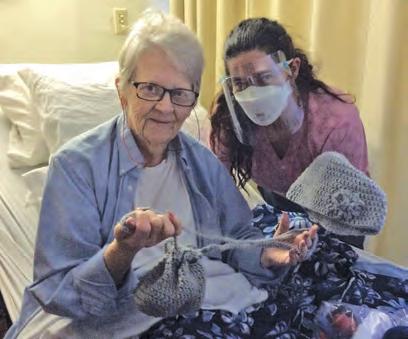Tillis looks toward the future in Canton Page 13

A glimpse into the world of novelist David Joy Page 24



A glimpse into the world of novelist David Joy Page 24







Although it has a long, illustrious history, the Waynesville Inn and Golf Club had aged over the years and lost some of its previous luster. However, with the efforts of South Carolina-based hospitality development, management and investment firm Raines Company and course designer Bobby Weed, the golf course — and the club itself — have been revamped into a destination to be reckoned with. (Page 6) Cory Vaillancourt photo
News
Haywood’s tourism authority takes bold steps under new leadership................4
Smoky Mountain News nets 38 NCPA awards..........................................................5




Moody, Dever sentenced in sovereign citizen ‘phony writs’ case........................8 Tillis looks toward the future in Canton......................................................................13
Cherokee man sentenced in meth case....................................................................14
Cherokee fair plans for 111th year..............................................................................15
New book details history of manufacturing in Jackson ........................................16

Sylva reinstates civil penalties for firearms, Molotov cocktails............................18

Union Academy transforms to Bartram Academy ..................................................19



Education briefs..................................................................................................................21
Opinion
The more things change, the more they remain the same....................................22
A broken heart is an open heart ..................................................................................22
A&E
A glimpse into the world of novelist David Joy..........................................................24
Outdoors
Blue Ridge artist Tray Wellington builds bridges with bluegrass........................34 Dahlias to dazzle in Highlands........................................................................................37
D ESIGN & PRODUCTION: Jessica Murray.


Snyder.
D IGITAL MARKETING S PECIALIST Stefanee Sherman.
ADVERTISING SALES: Susanna Shetley.
Amanda Bradley.
Sophia Burleigh.
C LASSIFIEDS: Scott Collier. .
N EWS E DITOR: Kyle Perrotti.
WRITING: Holly Kays.
Hannah McLeod.
Cory Vaillancourt.
Garret K. Woodward.
ACCOUNTING & O FFICE MANAGER: Jamie Cogdill. .



D ISTRIBUTION: Scott Collier. .
jessica.m@smokymountainnews.com
stefanee@mtnsouthmedia.com
susanna.b@smokymountainnews.com
jc-ads@smokymountainnews.com
sophia.b@smokymountainnews.com
classads@smokymountainnews.com
holly@smokymountainnews.com
hannah@smokymountainnews.com
cory@smokymountainnews.com
garret@smokymountainnews.com
smnbooks@smokymountainnews.com
. . . . . . . . . . . . . . . . . . classads@smokymountainnews.com
C ONTRIBUTING: Jeff Minick (writing), Chris Cox (writing), Don Hendershot (writing), Thomas Crowe (writing)
WAYNESVILLE | 144 Montgomery, Waynesville, NC 28786

P: 828.452.4251 | F: 828.452.3585
SYLVA | 629 West Main Street, Sylva, NC 28779
P: 828.631.4829 | F: 828.631.0789 I







Hosted By: Alex





 written by Ingles Dietitian Leah McGrath
written by Ingles Dietitian Leah McGrath








QUESTION: I have diabetes – do carrots have too much sugar for me to eat?




Answer: First it’s important to remember that carrots have sweetened beverage – unless of course you add sugar when preparing them. Carrots do contain carbohydrates coming from naturally occurring sugars in carrots.
• 1 cup of raw carrots = 52 calories; 12 grams of sugar—don’t cut out fruits and vegetables!


She’s only been on the job for a few months, but the Haywood County Tourism Development Authority’s new executive director is already taking steps to streamline and refine the authority into an organization that’s proactive and premeditated, rather than reactive and organic.
“It’s an evolution, right? I have the advantage of being new,” said Corrina Ruffieux, whose hiring was announced in January. “And that advantage is, I look at things a little bit differently.”
Ruffieux comes from Elizabeth City to Haywood County at a time when tourism development authorities across the state are increasingly being asked to address the harmful impact of visitation on locals while simultaneously handling more money than ever before.
A recent economic report prepared for VisitNC by Tourism Economics shows that in calendar year 2022, travelers pumped more than $33.3 billion into North Carolina’s economy, a 15.2% jump over 2021. The majority of the spending comes on food and beverages, followed closely by lodging.
Haywood County’s share of those billions was about $336 million, good for a rank of 22 among the state’s 100 counties and up 4% from 2021. The county’s travel and tourism sector boasted an $85.2 million payroll that employed nearly 2,100 people resulting in more than $12.5 million collected in state taxes and $11.4 million in local taxes, or about $379 per resident.
Occupancy tax collections, another good measure of visitor activity in the county, correlate closely with the growth in the state report.
For the 2022-23 fiscal year, which runs from July 1 to June 30, the HCTDA finally broke the $3 million mark with $3.04 million in collections, after just missing that mark in 2021-22 with $2.93 million in collections.
The latest collection numbers are essentially double those from just five years ago.
“I think Haywood County and probably a lot of rural Western North Carolina offer what people want, post-COVID,” Ruffieux said. “We have a product that the consumer wants. We have the outdoors, you can spread out, we’re in a great spot.”
That said, some counties have become victims of their own success, with anecdotal reports of tourists outstripping tourism infrastructure like bars, restaurants and even roads, making a great place to visit a difficult place to live.
Over the past few years, the tourism industry as a whole has learned some hard lessons on how to be less extractive.
“We’ve reinvested in projects that make
Haywood County a better place to live, Chestnut Mountain being an example, the Richland Creek Greenway,” Ruffieux said about two of the five projects that received monies from the TDA’s $500,000 one-time special projects fund last July. “We haven’t solely funded those by any means, but partially funded, and those funding streams make a difference to the locals because now they have a product that they can enjoy as well.”

While that’s true, the biggest downside of the upswing in tourism spending for Haywood County residents has been a runaway housing market that’s pricing out locals — some of whom work in the lower-
was 1,707.
The rise of short-term vacation rentals is making it more difficult for social service agencies, like Haywood County’s Mountain Projects, to administer Section 8 vouchers, which don’t pay enough for landlords who can make three times as much renting out their properties just a few days a month.
“The whole vacation rental thing is a hot topic everywhere,” said Jim Owens, new chair of the TDA board and a Maggie Valley alderman who spent 45 years in high-level hospitality industry positions, including at the Biltmore and SeaWorld. “I don’t know how you address it, or if it needs to be
better place to live. Affordable housing is going to need to be a piece of that conversation because if we don’t have places for people to live, then they can’t work in our restaurants or hotels.”
Currently, an RFP is out for the tourism master plan Ruffieux mentioned, focusing on four main goals: encouraging sustainable growth that benefits visitors and residents; bolstering the local economy against shocks like the loss of 1,000 jobs at Pactiv Evergreen’s Canton paper mill; long-term conservation of natural and cultural assets; and identifying and plugging gaps in current infrastructure like amenities, accommoda-
paying tourism economy.
The average sales price for a Haywood County home increased in July by 1.5% yearover-year to $401,183, according to Canopy MLS. In context, those figures actually compare favorably to the 15.2% increase in Buncombe County, where the average sales price is now more than $635,000, and the 9.9% increase in Jackson County, where the average sales price is currently $493,000.
Figures from the HCTDA show that during the exact same period the authority’s occupancy tax collections doubled, between 2018 and 2023, so did the number of shortterm vacation rentals in the county.
Back in October 2014, there were only 48 whole-house short-term vacation rentals in Haywood County. By October 2018, that number had grown to 878. This past May, it
addressed. There’s pros and cons. We’ve definitely seen an uptick, we’ve seen growth.”
There’s still no answer as to how TDAs can acknowledge the effect of tourism on the local housing market.
“That is a question that my peers all across the country are trying to answer. There’s a big lack of understanding of what occupancy tax dollars can and can’t be spent on, and it varies by state. Some states actually can spend it on affordable housing, but in North Carolina you can’t,” Ruffieux said. “That doesn’t mean we can’t educate people and work together to advocate for policies and procedures that really make a difference.
I’m hoping that through our tourism master plan — that plan’s focus is going to be about actionable items that make Haywood County more attractive to visit but also a
Tourism in Western North Carolina continues to grow. File photo
tions and transportation.
“I think we have to learn as we go. We’ve never done a plan on a countywide level before,” Owens said.
Owens mentioned a robust master plan by Rutherford County, which includes progress reports, as a great example of what he’d like to see.
There’s also an RFP out for destination branding services that will start by evaluating the current perceptions of the county as a destination and end with the implementation of a brand standards manual complete with identity, messaging, new branding, logos and fonts.
For the first time, the HCTDA will contract with a public relations firm to work in conjunction with its existing ad agency, South Carolina-based Crawford Strategies. Board members accepted a proposed contract with MMGY-NJF, a globally-recognized firm specializing in travel and tourism. The contract is open-ended, cancellable with 90 days’ notice and runs about $7,000 a month plus expenses.
Some changes to the authority’s bylaws are also in the works. The group sales committee will be eliminated as it’s not a focus of the HCTDA right now, Ruffieux said, and never even met. Nor did the government relations committee. The biggest change in committee structure will be the elimination of the 1% subcommittees, which will be channeled into a new entity, the product development committee.
Currently, Haywood County’s room tax rate stands at 4%,

The staff of the Smoky Mountain News won 18 advertising awards, including three first-place honors, as well as 16 editorial awards, including five first places, at this year’s North Carolina Press Association awards banquet. Awards were won in Division C, the largest division for nondaily publications.
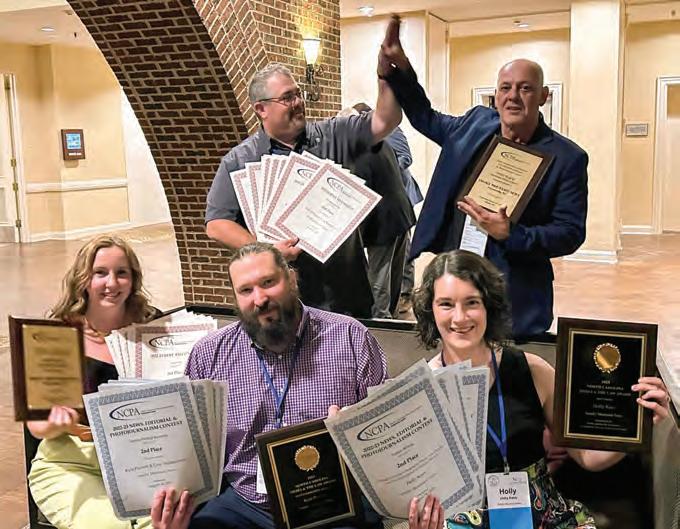

In addition, the staff won the overall General Excellence award, as well as the Advertising Sweepstakes Award. Kyle Perrotti and Holly Kays also each won a Media and the Law Award, which is judged by the North Carolina Bar Association; only four total Media and the Law Awards were given out across all divisions.
despite several unsuccessful efforts to increase that in the past.

That 4% is split into two different pots of money. Into the first goes 75% of occupancy tax revenue. Two-thirds of that must be used for promotion of the county as a destination, with the remaining third used for tourism-related expenses.
Into the second pot goes the final 25% of occupancy tax revenue, which is further divided up into five separate pots, one each for the five zip codes — Canton, Clyde, Lake Junaluska, Maggie Valley and Waynesville — that collect room occupancy taxes. The amount of revenue for each of those zip codes depends solely on the occupancy taxes collected within those respective jurisdictions.
In each of those zip codes, the so-called 1% subcommittees must make spending decisions on two-thirds of the revenue for the promotion of their specific jurisdiction, and the final one-third on tourism-related expenses within the jurisdiction.


Owner and publisher Scott McLeod said that while reporters do the job because they love it, it’s always nice to receive recognition for their hard work.
“Journalists aren’t in this business to win awards, they want to report responsibly on what’s happening in their communities,” he said. “However, when judges from other newspapers single out our work to be among the best in the state, it does make me proud of what we’ve accomplished.”
Individual winners included Micah McClure, Jessica Murray, Sophia Burleigh, Greg Boothroyd, Amanda Bradley, Cory Vaillancourt, Holly Kays, Kyle Perrotti, Hannah McLeod and Chris Cox.

“There were five separate subcommittees, and they met once a year. From a staff perspective, that’s a lot of committees to manage, and it was difficult for the committees to be as effective as they could be because they met so infrequently,” Ruffieux said.
The new committee will meet on a more regular basis and will focus on grant policies and procedures as well as making funding recommendations to the HCTDA’s main board. However, the board will still have the final say on recommendations made by the product development committee.


The product development committee will also manage the master plan process.


“That way we have every municipality and county level of representation at those master planning meetings helping us pick the agency that we’re going to work with, and helping lead some of those big conversations,” said Ruffieux. “Tourism is leading the process for this plan, but it’s not tourism’s plan. It’s Haywood County’s plan.”
perfect for all walks of life, from families to golf groups to ladies who lunch.We pride ourselves on using fresh ingredients from our gardens and supporting local farmers. The details are priority.

When old Jack Welch sold his Waynesville dairy farm to Jim Long in the early 1920s, he probably couldn’t have envisioned that it would one day become a topnotch golf club with stunning views of the Great Smoky Mountains and clubhouse amenities renowned throughout the southeast as some of the most luxurious.

Nearly a century later though, the clubhouse and guest rooms looked tired and dated. Even the famed “Carolina Nine” course was showing its age.
Now, after extensive rehab by a new owner, the Waynesville Inn & Golf Club is poised to tee up its second century and celebrate the rebirth of “mountain chic.”

“It’s an experience-driven property,” said JD Trueblood, membership director at the Waynesville Inn & Golf Club. “This property, we want it to feel warm and comfortable to guests.”
In April 2021, South Carolina-based hospitality development, management and investment firm Raines Company purchased the 165-acre site, along with its 111 guest rooms and 27 holes, for $9 million. At the time, more than $25 million in improvements were planned, making the purchase one of the most significant economic development investments in Haywood County, ever.
“One of our partners was at our sister property over in Asheville, the Foundry Hotel, and he got an invite,” Trueblood said. “He had no idea about this property until he got here and immediately saw the potential that something really special could be done here.”
In 1926, Scottish-born golfer and golf course designer Donald Ross left his mark on Welch’s dairy farm by designing the Carolina Nine — as legend has it, on a napkin. Ross is also known as the designer of the Asheville Municipal Golf Course as well as the prestigious Pinehurst No. 2 course.
Welch’s old dairy barn would become a clubhouse, complete with card tables, a dance hall and even a space for the club’s first pro to live.
Three years later, the club purchased an additional 50 acres, allowing for the completion of another nine-hole course, called the Dogwood.
The iconic Lodge seen today was completed with local stone in 1935. Another building, called Woodcrest, was built next to the Lodge in 1939. In 1946, new owners W.T. Eller and his son-in-law George Kimball modernized the club by adding conference space and locker rooms.
After another ownership change in 1963 the club’s first irrigation system was installed, as was a modern swimming pool, which replaced an earlier pool that was supplied with creek water.
Mr. and Mrs. William Hall purchased the property in the late 1970s, embarking on an extensive rehabilitation program both on the course and in the guest rooms. Additional acreage was added, which became the property’s third nine-hole course called the Blue Ridge.
The four-story tower and pavilion were also added during this time to connect the original Lodge to the Woodcrest building. In 2006, another new owner expanded dining and spa options so non-golfers could also enjoy the facility.
By this time, the facility was becoming something of a “grand old lady” in terms of Western North Carolina golf courses. Sure, there were still some dignified flashes of her once revered majesty, but you had to look hard to see them.

Just a few months after the property was purchased by Raines, the company shut it down so that work could proceed in earnest. On July 1, the club reopened to members with improve-
ments to the facilities, the accommodations and, of course, the course.
The newest nine, called the Blue Ridge, was often referred to as something else by the duffers who played it — a band aid. It lacked coherent flow and seemed somewhat cobbled together.
Enter Bobby Weed, who like Ross is another revered golf course designer. Weed’s in-laws have ties to the Waynesville area that date back to around the time the club was established, and as a longtime seasonal resident, Weed said it was “a dream come true to personally steer the club in a new direction for future generations.”
Weed consolidated holes from the Dogwood and Blue Ridge nines into a composite layout now affectionately referred to as the Weed Nine. Holes that weren’t utilized for the Weed Nine were converted into something the property had always lacked — adequate practice space.

A short out-and-back wedge course now sits between the 1st and 18th holes. An 18,000 square-foot lighted Himalayan putting course along with a new driving range and a chipping and bunker complex were also added.
Not to be neglected, the original Carolina Nine, now called the Ross Nine, was restored by Weed with due respect afforded to Ross’ original vision.
The result is a 6,500-yard, 18-hole, par 70 championship course with a rating of 71.5 and a slope of 139 — slightly higher than Augusta National and somewhat more difficult than average.

But not everyone who visits a golf club necessarily cares about actually playing golf there. For that reason, WIGC has invested significant resources in adding and upgrading the facilities, with an eye on style and an attention to detail that can even be seen in the club’s new logo — a bear whose shoulders and back are an exact copy of the mountain range that surrounds the club.
“Our owners wanted to make sure this is a golf club, but that we do have a couple non-golf related amenities that will help bring families together,” Trueblood said.
The club boasts two separate, fully updated food and beverage options. The Watershed Tavern includes Appalachian and old-world pub fare, while the Grill strives to provide “casual yet elevated” dining with seasonal menus, American flavors and a few wood-fired offerings.
A new heated swimming pool now sits on what used to be pavement near the entrance, adjacent to a state-of-the-art fitness center.
Guest rooms, part of the Trademark Collection by Wyndham, have all been updated and completely redone, preserving the comfy charm while adding contemporary flourishes and just a little bit of that mountain chic.
“A lot of the history has been preserved here from an exterior perspective, but when you come inside of the rooms, they’re very refined,” Trueblood said. “They’re upscale with kind of an understated attitude.”
And again, those details — some of the rooms have outdoor balconies that overlook the first tee, where generations of golfers made their mark on the wooden decking, still pitted with divots from old metal golf spikes.

As a quirk of the old building’s layout and design, each room is slightly — or dramatically — different, a factor WIGC embraced.
“We want you to feel like it’s not just a cookie cutter room,” said Trueblood. “We want you to make sure that when you’re here, you’re having a really unique, really
The new Waynesville Inn and Golf Club offers both golf and social memberships, along with select real estate offerings. For more information, contact JD Trueblood at 828.407.0505 or email membership@waynesvilleinnandgolf.com. For more information, visit waynesvilleinnandgolf.com.

good experience for yourself, and for your friends and your family.”
For those seeking a little more privacy, space and style, three new four-bedroom cottages near the Lodge overlook one of the greens, and a stubbed-out concrete pad waits for one more.
“They’re for the golf enthusiast who wants to bring up fellow members or clients,” Trueblood said. “It’s a real high-end kind of place to stay for golfers that may be coming through whether it’s a day or a few nights making a swing through Western North Carolina.”
The cottages also offer a somewhat unique revenue-sharing ownership structure;
an owner can enjoy exclusive access when they want to, and let WIGC rent it out when they don’t.
The rooms and cottages also offer a way for the general public to access the course. As a membership-based club, none of the facilities are open to non-members, but hotel and cottage guests can pay to play.
There are also plans to add single-family homes and bungalows along the 10th and 12th fairways.

“I know the interest is definitely there amongst our membership, our investors and kind of the whole group of people that are here, that know about Waynesville,” Trueblood said. “Waynesville is a really good
market in terms of homes. The demand is way up, the supply is low. Hopefully we can do it in a really good way. We’ve been patient with it, we want to wait until the time is right, to be able to have all of our ducks in a row and have our developers in a really good healthy position to where they can finally release more information.”
As WIGC grows into the community throughout its next hundred years, Trueblood said that the club also wants to remain a positive influence on Western North Carolina’s next generation.
Since day one, the club has employed dozens of local contractors in several different phases of the rehab, including Patrick Bradshaw of Civil Design Concepts, and uses local products like Smoky Mountain Roasters Coffee, Hazelwood Soap Company bath and body products and Boojum Brewing beers.
They’ve also invested in the community in a different way. Call it an investment in the future.
“I think our partners, myself, our staff and our team has come from the world of golf, and golf has meant a lot to all of our lives. We want to make sure that junior golf flourishes,” Trueblood said. “You can see behind us; we’ve got some Western Carolina University folks playing right now. We want to make sure that we can give back in a healthy, positive way where young people know that we care about them, and being able to get them out here on the course, to practice, play and to be part of what golf has brought us.”
Two defendants who pleaded guilty in federal court for their roles in communicating threats to dozens if not hundreds of elected officials, judges and public figures across the nation and across Western North Carolina have finally learned their fates, as U.S. District Judge Martin Reidinger handed down sentences in Asheville on Aug. 24.
“I think the judge did the best he could under the circumstances,” said Anthony Sutton, a member of the Waynesville Town Council and one of the 57 victims of Haywood County resident Darris Moody and Chicago-area man Timothy Dever. “I’m satisfied.”
The verdicts came just one year after The Smoky Mountain News was first to report on a series of threatening faxes from an unknown sender that were received by a host of officials across the region.

Called “writs of execution,” the faxes had nothing to do with capital punishment but instead purported to satisfy a judgement issued by a non-existent environmental court that pronounced defendants guilty in absentia of treason and of poisoning the nation’s drinking water supply.
On condition of anonymity, one of the recipients shared the phony writ that they received with SMN. It demanded a $1 million fine, and that the recipient surrender themselves to a “tribunal.” Those who failed to comply would be subject to citizens’ arrest by anyone interested in collecting bounties of up to $20,000.
Further investigation by SMN traced the phony writs back to Moody, a Haywood County woman, who got them from the now-deleted website of an organization calling itself “The People’s Bureau of Investigation,” run by Dever.
The site also provided a robust database where those who had “served” the writs could post the names and addresses of the officials they served them to. All told, SMN identified nearly 1,000 writs served to people in 41 states — Democrats and Republicans, federal, state and local. Dever and Moody spoke with SMN prior to their arrests. Dever asserted that the writs were legitimate, while Moody admitted to sending them.
Both espoused sovereign citizen ideology, the core of which avers that by reciting some incantation of cobbled-together conspiracy theories and archaic legal terminology, socalled “sov-cits” can somehow utilize longoverlooked loopholes to assert their independence from governments, law enforcement agencies, taxing authorities, public utilities, licensing bureaus and anything they don’t like.
Moody was arrested by the FBI just three hours after the publication of the SMN story
that revealed her identity. Amid the protestations of Assistant U.S. Attorney Don Gast, Moody was granted bond on Sept. 12, 2022, by Magistrate Judge Carleton Metcalf on the condition that she appear as ordered before a court whose jurisdiction she freely admitted she didn’t recognize.
On Oct. 14, 2022, Moody failed to show up for her arraignment on 59 violations of 18 USC 875, interstate threatening communication. She was taken back into custody later that day and held without bond until trial.
By Dec. 14, 2022, Moody’s case had grown into an interstate conspiracy, with the addition of two new defendants, Dever and Dee Thomas Murphy of Austin, Texas. In January of this year, Moody finally acknowledged the jurisdiction of the United States justice system by signing a plea agreement. Dever later did so as well.
because of the victims’ dedication to public service.”
Still, the government only sought a sentence within the applicable guideline range for 18 USC 875 (c) — up to five years imprisonment — despite the “substantial” aggravating circumstances and despite the government’s position that the guidelines aren’t reflective of the seriousness of the offense. Their recommendation was between 30 and 37 months.
Prosecutors outlined the gravity of the threats by noting the cash bounty offer, the PBI database that contained the home addresses of the victims and the fact that the victims weren’t just threatened by an individual but rather by an organization that “hid behind the mask of being ‘of the people.’”
Moody’s threats required deliberation and premeditation and weren’t simple “guttural snarls in the darkness,” per the memo.
“The Defendant published the documents, trained his supporters how to serve them, promised monetary rewards, and provided the means to post his victims’ personal information on his website,” it reads.
In one of the training videos, Dever declares his intent to “abolish our government” and therefore target American democracy and the rule of law. Evidence gathered from Dever’s phone shows disturbing messages promoting violence against government officials, including his need for “lots of tarps.” In communications with sovereign citizen and anti-government activist Rod Class, Dever produces several photos of a pistol and asks Class to arrange a meeting so that Dever could give the pistol to “the trigger man.”
In further messages to Moody’s husband, Charles Moody, Dever said that in a perfect world he should be able to go to federal marshals, tell them that he’s going to apprehend the judge and prosecutor and then “take them out back and shoot them in the head.”
Other messages sent by Dever after his initial arrest mention tar and feathers, killing FBI agents, and a plan to arrest the judge and prosecutor on Nov. 28, 2022.
“You just need to arrest these bastards while I record it. We the people need to start taking communists down! I will bring the tarps and be there Monday,” Dever wrote to an unspecified recipient. “They have overstayed their visit here in this timeline.”
Even after Dever’s March 23 guilty plea, he continued to make threats, according to Gast.
A jailhouse informant told the FBI that Dever had pledged violence against Metcalf and U.S. Attorney Dena King. According to the informant, Dever considered looking for the schools King’s children attended as well as her home address so he could arrest her, place her in a FEMA camp and execute her by setting her on fire.
“The bitch is going to get it,” Dever told the informant.
In other phone calls two weeks after his guilty plea, Dever talked about beheading King for treason.
“Dever’s ideology is violent and extreme; and his recent activities demonstrate that he is not remorseful, despite his guilty plea,” the memo reads.
Despite the well-documented intrigues of the case, as the months wore on and the court unsealed more and more documents, they provided even more insight into what, exactly, Darris Moody and Tim Dever had done.
According to the government’s sentencing memorandum, interstate threats to kidnap or injure others usually involve a single victim, but Moody’s threats were “very different, both in scope and in content.” Moody, it reads, put dozens of victims “in reasonable fear that armed, anti-government conspiracy theorists might invade their homes and arrest them for a cash bounty
Instead, the memo reads, they were “an affront to American democracy.”
The memo also anticipated the defense’s position on sentencing, saying that Moody’s plea deal had already accounted for any mitigating circumstances and that a downward variance from the sentencing guidelines would be inappropriate especially because of the “staggering” number of victims.
The government’s sentencing memorandum for Dever includes language similar to Moody’s memo, but recognizes Dever’s larger role in disseminating the threats much more broadly than Moody did — more than 900 in at least 32 states.
It mentions the cash bounty offer, the PBI database and the organizational nature of the threats, calling them “chilling” and naming Moody as Dever’s agent in Western North Carolina.
Prosecutors sought a sentence of 180 months.
Meanwhile, in the defense’s sentencing memorandum, Dever’s attorney, Howard W. Anderson III, argued for leniency by stating that although Dever crossed the line from protected First Amendment speech to criminal threats, it was “all talk” and the government had produced “no evidence of any actual or attempted violence” in Dever’s past or in relation to the case.
“No stockpiled guns. No casing of victims’ homes. No practice runs. Mr. Dever certainly talked — too much and, at times, about inappropriate things [but] if actions speak louder than words, inaction should, too,” reads the memo.
After undergoing a psychological test this past May, Dever was noted to have “overcome ‘some of his previously held extreme over-
valued beliefs,’ ultimately making a ‘marked improvement,’” according to the memo, which then ponders whether prison is the appropriate environment for Dever to continue his journey to wellness.
Dever’s attorney also made a pitch for the judge to avoid sentencing disparities by comparing Dever’s proposed sentence to those of several people convicted in relation to the events of Jan. 6, 2021.
Stewart Rhodes and Kelly Meggs received sentences of 18 and 12 years, respectively, for their roles in organizing and executing the breach of the U.S. Capitol building. Dever’s conduct, the memo argues, doesn’t rise to that level and therefore neither should his sentence.
On Aug. 21, Dever filed with the court five letters of support, including from a cousin, an uncle, two sisters and his wife of 30 years, who said that Dever spent considerable time and money on the PBI website in order to help his fellow citizens avoid “poisoned water,” but that he went about it in the wrong way.

“During our many years together he has believed in several conspiracy theories. He went into overdrive during COVID. I did not agree with what he did, but he got carried away with himself and seemed to believe what he heard from others,” she wrote.
Moody, too, filed 10 letters of support from aunts, uncles, friends, a pair of Baptist pastors and a cousin in Waynesville who said he was shocked when he heard of her actions. They all asked for leniency based on Moody’s history as a church pianist and gospel performer and described her variously as kind and humble but brainwashed.
Moody also filed a report by a forensic psychologist who evaluated her in March. The report chronicles Moody’s sad, slow devolution from respected community member and small business owner to convicted felon.


Her background is relatively pedestrian, with no significant history of criminal behavior or drug or alcohol abuse. She received minor psychiatric treatment for a fear of heights and was prescribed Lexapro, commonly used for depression and anxiety, which she used until her arrest.

In 2013 Moody lost her father, which is said to have affected her deeply. In June 2020, Moody had disagreements with members of her church over COVID masking, which led to the Moodys severing ties with them.
In 2021, around the time Moody retired, she and her husband attended an event in Gettysburg, Pennsylvania, about child sex trafficking, which she said was “the seminal event in her becoming interested in conspiracy theories which became the belief basis for her offense conduct,” according to the evaluation.

Around that same time, Moody was diagnosed with adjustment disorder with mixed anxiety.


The evaluation concludes by presenting several mitigating factors for Moody, including her work history, positive relationships, history of volunteer work, absence of addiction or of antisocial or violent behavior, lack of risk for future violence, further presenta-

tion of undiagnosed psychiatric symptoms, lack of financial gain from her offense and her “high-level coping skill through lifelong investment in music.”
The sentencing memo filed by Moody’s attorney asks the judge to recognize that “there is so much more to Mrs. Moody than this crime,” and includes sympathetic photos of Moody performing in church, holding her newborn daughter and smiling with her granddaughter. It also presents the same arguments made in the letters of support — her history of involvement with the church, her retirement, her financial problems, her growing sense of isolation and her need for personal interaction.

“Suddenly, Mrs. Moody began to feel like all the stable, grounding forces in her life were slipping away,” the memo reads. “She began a downward spiral after this.”
That Moody has had “a lot of time to reflect on her actions” in the 10 months she’s spent at the jail is noted in the memo, as is her remorse and desire to “turn back time and take back all of the harm she caused the victims here.”
The memo argues for a downward variance in sentencing due to her charitable service in church, her mental and emotional condition and her remorse. Moody’s attorney asked for a sentence of time served.

On Aug. 25, Moody and Dever were led into a federal courtroom in Asheville, shackled and emotionless, in drab earth-toned jumpsuits.
“Obviously having a joint sentencing hearing is far out of the ordinary for all of us,” Reidinger said from the bench, explaining that because some of the victims were in attendance, it would be easier for them to deliver impact statements.
Reidinger heard from defense attorneys who reiterated their requests for leniency. Although Moody had some objections to the presentencing report, she withdrew them and Reidinger accepted her plea agreement. Dever, on the other hand, made several objections to his presentencing report — specifically, enhancements to the sentencing guidelines
PAGE 10
that could have put him away for 15 years. His attorney restated his assertion that there were no concrete plans, no stockpiles of guns, no casing of victims’ homes, no actions to warrant a six-level enhancement.
Gast countered by mentioning that there was sufficient evidence to support the enhancements because the violent threats were real, whether they were ultimately realized or not.
“This notion of ‘just talk’ is nonsense,” Gast said. “This was not a joke. This was not satire.”
Dever’s objection was overruled, prompting him to whisper angrily to his attorney and shake his head. Dever then interrupted Reidinger, saying that he might have to fire his attorney. Marshals led Dever out of the courtroom to confer with his attorney in private. They returned minutes later, and Dever opted to retain his attorney rather than proceed pro se.
His next objection, about a four-level enhancement for taking a “leadership role” in the offenses, was also overruled. Dever’s attorney claimed the PBI is a decentralized organization with no real leader, but Reidinger didn’t buy it.
Clearly frustrated, Dever at times slumped in his chair, rubbing his temples and placing his head on the table.
Gast then countered with an objection of his own, pushing for an enhancement for obstruction of justice. Dever had apparently asked others to blockade the Buncombe County Detention Center to prevent the transfer of Moody. Reidinger said that Dever’s hyperbole was not an actual attempt to obstruct.
Reidinger then accepted Dever’s plea agreement, and moved on to impact statements from victims — public officials who had been “served” with the phony writs.

Donna Forga, a district court judge, said that the defendants had taken her “peace” and affected her ability to participate in activities involving her grandchildren. She was also concerned about the safety of her husband, who was ill and homebound. After being served with the phony writ, Forga attended her high
school reunion and became rattled when someone joked to her about collecting the bounty. She left the event. Having known both Darris and Charles Moody since high school, Forga said she couldn’t believe the Darris she knew would act in such a manner, but openly wondered, “Who else has been emboldened to act this way?”
Moody, head in hands, appeared to sob. Roy Wijewickrama, chief N.C. district court judge, recalled being rendered “speechless” when he received his copy of the phony writ. Like Forga, Wijewickrama said he knew what he signed up for when he decided to become a judge but called Moody’s threat “beyond troubling” and said he was worried about his wife and kids.
her own to the Haywood County sheriff, who told her, ‘This is not a real warrant, but it is a real threat.’” Freeman is the longtime director of Haywood County’s domestic violence nonprofit and said that one of the addresses posted on the PBI database was actually the group’s secret safehouse for victims fleeing violent or abusive living arrangements.

“I am now always looking over my shoulder,” she said. “I have been harmed, but I am not broken.”
Freeman’s fellow Waynesville Town Council Member, Anthony Sutton, called the threats “calculated and malicious” and mentioned the anguish the phony writs had caused his loved ones.
“While I am thankful that law enforcement intervened in time to prevent the full realization of this horrific crime, I remain forever changed by the events that transpired,” Sutton said. “The sense of security and freedom that I once took for granted has been shattered, replaced by a haunting feeling of vulnerability and helplessness.”
“What we’re dealing with here today, I just can’t understand,” he told Reidinger.
Julia Freeman, an elected member of the Waynesville Town Council, told Reidinger that she would never forget receiving a call from a friend who told her about seeing a warrant at the post office with her name on it. She was deeply disturbed by the call and made a call of
Once the victims were through, Reidinger asked Moody’s attorney, Assistant Federal Defender Emily Jones, for her recommended sentence. Jones again asked for time served and a short period of home confinement, saying that Moody got caught up during a vulnerable time in her life and that she was “in the thrall of this organization.” Gast responded by saying that because the government didn’t seek an upward variance in the sentence, Moody had already received all the mercy she should expect.
“This case has a uniquely high F
“I am now always looking over my shoulder. I have been harmed, but I am not broken.”
— Julia Freeman, Waynesville Town Council member
need for general deterrence,” Gast said, noting that there were “many more Mrs. Moodys” out there.

“The court’s judgement needs to tell people, ‘Knock it off. No more,’” Gast said.



Moody then addressed Reidinger, apologizing to the court, the victims and their families and promising it would never happen again.
“I’m still in shock that I even listened to such deception and misinformation,” she said, expressing a desire to restart her life and rejoin her community.
Reidinger asked Dever’s attorney for his recommended sentence. Anderson said he understood and empathized with Dever’s victims, and hearkened back to the “inaction” clause in his sentencing memo. He also said that Dever had come a long way since his arrest last year.
Gast repeated his call for a “modest upward variance” in the sentencing guidelines and called Dever the “mastermind, creator, promoter and recruiter” of the entire scheme.
“Defendant said he fell down a rabbit hole during COVID,” Gast said. “He dug that hole.”


Repeating his desire for general deterrence, Gast said that Dever had been present in Washington, D.C. during the Jan. 6 insurrection and that on Aug. 18, just six days before their court appearance, Dever made phone calls questioning the jurisdiction of the court.
When Dever finally addressed that court, he put his hand on a Bible and swore that many of the things Gast had said were simply not true, and that the jailhouse informant was also lying about Dever’s alleged threats against court personnel. Dever spent several minutes trying to relitigate his case, maligning the investigation, the prosecution and his defense attorney before stating that he was still “in shock” because so many of the facts brought out in court were “beyond [his] imagination.”
His hands shaking, Dever read from a lengthy missive he’d penned, apologizing for his bad decisions and blaming Dee Thomas Murphy — originally part of the investigation before he passed away in January — as the ringleader. Murphy, Dever said, led him to believe that it was his duty to stand against “poisoned water” and “overreach” by federal, state and local governments during the Coronavirus Pandemic.
Dever, shaking and crying, related incidents from his childhood and ended his speech by reciting the Pledge of Allegiance.
“It goes without saying that these cases are among the most unusual and out-of-the-ordinary to come before this court in some time,” Reidinger said, echoing his comments at the beginning of the hearing. “But there are lots of things that don’t add up.”
Among them were that Dever started the PBI supposedly to protect people’s rights, but then proceeded to issue phony writs from a sham court that offered no due process rights to the accused, who were judged “guilty” in absentia.
“The offense conduct in these two cases can only be described as tyrannical,” Reidinger said, later adding “vindictive” to the description.
He compared the sham court’s proceedings to the show trials conducted by Soviet dictator Joseph Stalin in the late 1930s. Stalin used the trials to purge political opponents with trumped-up charges that often resulted in defendants being executed or worked to death in gulags.
“But in Stalin’s show trials, at least there was a ‘trial,’” Reidinger said.







Another thing that didn’t add up for Reidinger was hearing about who the defendants were before they became ensnared in a web of conspiracy theories, misinformation and outright lies. Moody was a well-regarded businesswoman and churchgoer. Dever was a successful entrepreneur and caring family man.
But perhaps the most striking incongruity was the defendants’ self-identified reverence for the founders, and the founding documents — the principles and guardrails of participatory democracy that the defendants ignored and ultimately sought to overthrow.
Reidinger concluded by saying that you can dislike the federal government all you want, and that you can dislike your state government all you want, and that you can dislike your local government all you want, and that you can complain loudly about any or all of them, but you cannot threaten to overthrow them.
He sentenced Moody, 57, to 24 months imprisonment for one count of making an interstate threatening communication, with three years of supervised release after her confinement ends.
Dever, whose involvement in the dissemination of the writs made him a much more important figure than Moody, got 60 months of imprisonment for each of five counts of aiding and abetting interstate threatening communication, but some of the sentences will run concurrently, resulting in 120 months of incarceration. He’ll be 67 years old when he’s freed.
Wijewickrama said he was very satisfied with the sentences and that they were appropriate given the crimes and the circumstances.
Freeman, like Wijewickrama and Sutton, agreed.
“I believe in free speech,” Freeman said, adding that she thought the sentences were fair. “But people can’t make threats against you and your family. They have to have respect for the government and the rule of law.”
“It goes without saying that these cases are among the most unusual and out-of-the-ordinary to come before this court in some time, but there are lots of things that don’t add up.”
— U.S. District Judge Martin Reidinger

North Carolina Republican Senator Thom Tillis has taken a particular interest in Canton over the past few years, making multiple appearances in town after flooding in August 2021 and acting as a federal liaison during the ongoing paper mill shutdown saga.
Tillis again returned to Papertown on Aug. 23, hosting a brief but wide-ranging town hall and taking questions from elected officials and municipal administrators on everything from the future of the paper mill to cannabis legalization.
Canton Mayor Zeb Smathers welcomed Tillis to BearWaters Brewing, expressing his appreciation for Tillis’ continuing support.
“Yes, he’s my senator but he’s also a friend, because at the end of the day, this is and always will be about doing the best for our respective homes and the state,” Smathers said while introducing Tillis to a crowd of about 40 local officials that included representatives from Haywood County government, several municipal governments and the Southwestern Commission.
Tillis said he couldn’t believe he was standing in BearWaters just then, after flooding gutted the building only two years ago.
“It’s great to see the resilience. It’s, I think, a great symbol for the future of Canton. I think it’s a great symbol for the future of this region,” he said. “What we’ve got to do is not just show up a day or two after the storm, but keep showing up until we’re fully recovered.”
Canton’s path to recovery became all the more difficult after its largest employer pulled out this past June, but both Tillis and Smathers looked to the town’s future.
“We’re going to do what we can to weigh in on what happens with the paper mill and what happens with the future of Canton,” Tillis said. “Tell us what we can we do. You’re working hard on the ground. What we can do is clear any sort of traps that may be up in Washington that are [related to] resources that are necessary to look ahead. Canton’s got a great history. But now we’ve got to talk about a future that you’re going to be proud of. It’s a pivotal time, and we’ll be here. And we’ll be back as long as it takes to make sure that you all are on sound footing.”
When Pactiv Evergreen first announced it would close its Canton paper mill back in March, company officials cited the state of the paper market as the primary reason.
Byron Racki, at the time president of Pactiv’s beverage merchandising division, said it had “gone to hell.” Daniel Flippo, director of the United Steelworkers southeastern region, said that while the market hadn’t gone quite that far, it had been dras-
Haywood County Sheriff Bill Wilke, who’s made a strong anti-drug push since being elected last fall, asked Tillis an important question about the conflict between states and the federal government.
“I’m curious to know what your thoughts are on the way forward in terms of the legalization of marijuana,” Wilke said, adding that he’d seen studies linking early use of high-potency strains of cannabis have a link
Tillis said he was concerned about the behavioral health aspects of legalization, and also that the race for potency through genetic engineering would one day reach its limit, perhaps leading producers to introduce other ingredients to differentiate their products from their competitors.
Another drug-related question came to Tillis, asking for his take on the opioid crisis in light of claims that although the federal government continues to dump money into the problem, it’s not gone away and despite best efforts, 54% of people struggling with mental health or substance abuse are going unserved.
Tillis said he’d taken some heat for sponsoring the Bipartisan Safer Communities Act with fellow Republican Sen. John Cornyn of Texas, and Democratic Sen. Chris Murphy of Connecticut.
Passed in 2022, the legislation supports creating mental health service programs in schools and assists state governments in expanding behavioral health clinics as well
tically reduced.
Tillis was asked by The Smoky Mountain News if he was aware of changes in any foreign trade policies under the administrations of former President Donald Trump or current President Joe Biden that would support Pactiv’s claim about the dismal state of the paper market as the reason Pactiv packed up and left.

“I could imagine it was a factor, but not the dominant factor. There have to be other reasons,” he said. “I just I don’t believe it.”
Tillis explained that he’s been aware of unfair trade practices on the part of China, including dumping excess textiles onto the market to drive down cost and put competitors out of business, but didn’t specifically mention paper. He has proposed legislation that would crack down on China’s market manipulation, but again downplayed Pactiv’s assertion.
“It would shock me if [Pactiv] Evergreen could cite that as the primary factor for the closing,” he said. “There had to be other issues involved.”
to schizophrenia.
As of Aug. 1, 23 states plus Washington, D.C. have implemented legalized recreational cannabis, while 40 states plus D.C. have approved some form of medicinal cannabis. North Carolina is one of the few states that have legalized neither, and the plant remains federally classified as a Schedule 1 controlled substance.
The federal stance prevents legal cannabis businesses from accessing the nation’s banking system and is sometimes used as a reason for states to continue prohibition. But it also prevents the federal government from stepping in and regulating the industry.
“I think, you know, the bell has rung when you have red states and blue states [legalizing cannabis],” Tillis said. “I for one think that we should look at it like tobacco. We should regulate the crops, the FDA should have a role to play in terms of potency, ingredients, delivery methods, we should have a federal excise tax on it and we should have serious consequences, like the tobacco industry, if you run out of line.”
as providing telehealth services under both Medicaid and the Children’s Health Insurance Program.
“It’s the single largest investment by the federal government in behavioral health,” Tillis said. “And I’ll tell you why law enforcement should like that bill, because of the five states that implemented it back in 2017, a couple of those states had 50% reduction in mental health admissions to hospitals.”
The bill also contained some gun control provisions that didn’t exactly please Second Amendment advocates, including the NRA.
“A lot of people on my side of the aisle call it a ‘red flag’ bill. It wasn’t a red flag bill,” Tillis said. “Matter of fact, it does the opposite of a red flag bill.”
Red flag laws allow law enforcement agencies to confiscate firearms temporarily from people who may be a danger to themselves or others. Some have voiced due process concerns in red flag proceedings, and Tillis said the law specifies that if states violate due process, they’re “not going to get a dime in federal dollars.”
But the legislation did expand background checks for firearms purchases and allows grant funds to be used by states for crisis intervention programs, like red flag laws. It also prescribes strict compliance with due process for those red flag hearings.
“Canton’s got a great history. But now we’ve got to talk about a future that you’re going to be proud of.”
— Thom Tillis
ACherokee man will serve more than seven years in federal prison after pleading guilty to a charge of possession with intent to distribute methamphetamine.
Edward Dwayne Taylor, 35, received the sentence from U.S. District Judge Martin Reidinger Thursday, Aug. 24, in connection with a case originating from a traffic stop on June 4, 2021.
According to the Factual Basis filed in court, which lays out a version of events agreed to by Taylor in support of his guilty plea, Cherokee Indian Police Department Officer Dustin Wolfe made the stop that led to Taylor’s conviction after spotting a vehicle whose usual driver he knew to have a suspended license. Another passenger in
Legal Aid of North Carolina announced it has been awarded a $500,000 grant from the Governor’s Crime Commission, the chief advisory body on crime and justice issues to North Carolina’s Governor and Secretary of Public Safety,
the vehicle had an active tribal warrant for his arrest and was found to have a “large quantity” of suspected methamphetamine on his person. Police also found digital scales, small plastic baggies and items consistent with drug distribution.
Taylor was initially released at the scene but later arrested after the car’s driver and the man initially found in possession of the meth told police that the drugs belonged to Taylor, but that Taylor had asked him to hold them ahead of the traffic stop.
“He confirmed that Taylor told him to
to support survivors of domestic violence, while also increasing awareness and education statewide.
Domestic violence related homicides in 2023 have also been increasing. Within the first six months of the year, 39 homicides have been reported, according to the North Carolina Coalition Against Domestic Violence Fatality Report. In addition, from 2019 to 2021, there were more than 138,300 reports of assaults committed by former intimate partners or family members, according to
hide the meth,” the Factual Basis states. “While he denied that Taylor threatened him, he implied that he feared Taylor would react violently if he refused.” When officers interviewed Taylor, he admitted the drugs were his. In all, he had 136.56 grams of meth and intended to distribute it to others.
A criminal indictment was issued on Aug. 2, 2022. Taylor entered a guilty plea on Feb. 2, and the sentencing hearing was held on Aug. 24 at the U.S. District Court in Asheville.
the Criminal Justice Analysis Center, North Carolina’s Statistical Analysis Center.
The Governor’s Crime Commission annually awards state and federal grants to North Carolina law enforcement, governmental bodies and related non-profit agencies.
Legal Aid of North Carolina will direct efforts towards launching an integrated domestic violence awareness campaign running through National Domestic Violence Awareness Month in October. The campaign will include:
Reidinger considered two letters of support entered on Taylor’s behalf when considering his sentence. One letter, written by a close friend of five years, wrote that Taylor is “loving, caring, loyal, truthful, respectful, dependable and a very good listener also,” and that she believes he intends to make changes to his life as a result of this case. The second letter, written by his mother’s boyfriend, also vouched for Taylor’s character and said that he “has a good head on his shoulders” and “is very helpful to all his family and friends.”
Reidinger sentenced Taylor to serve 87 months in prison, followed by five years of supervised release. Taylor is in federal custody and will be transferred to the custody of the federal Bureau of Prisons upon designation of a federal facility.

• An interactive website stopthecyclenc.org, which will include resources for survivors
•.Compelling creative statewide outreach and events to increase awareness of services that are available through Legal Aid of North Carolina for survivors
• A powerful documentary that provides an intimate look at stories of domestic violence survivors in North Carolina and a series of documentary screenings throughout the state to uplift and provide survivors with resources




The Cherokee Indian Fair will return Oct. 3-7 for its 111th year, but in a new location. This year’s event will be held at the old high school site, also called the Cherokee Expo Center, located at 1501 Acquoni Road.
The fair traditionally takes place at the Cherokee Indian Fairgrounds on Tsali Boulevard, also referred to as the Ceremonial Grounds, but has been temporarily relocated to allow for a complete renovation of that property. In July 2022, Tribal Council approved spending to demolish existing facilities and create a comprehensive master plan for the site. The renovation required temporary relocation of the annual fair, as the project was expected to take 18-24 months to complete.
Last year, the fair was held at the Cherokee Convention Center at Harrah’s Cherokee Casino. Special Events and Fairgrounds Supervisor Lisa Frady said she’s looking forward to using the Expo Center, which is a larger facility. She hopes to hold the event there next year as well. Delays with the Fairgrounds renovation project mean the fair is unlikely to return to its traditional location by 2024. However, fair organizers say they have high hopes for the new location.
“The more I’ve spent time up there, the more I’m seeing potential for that area,” said Destination Marketing Director Sean Ross in an Aug. 21 EBCI Planning Board report.
The theme for the 2023 fair, “They Made the Way,” honors Cherokee people past and present who have played pivotal roles in shaping the community’s vibrant culture. Over the course of five days, fairgoers will experience everything from traditional stickball games and authentic crafts to an array of rides and games. During an Aug. 21 meeting, Ross told the Planning Board that the carnival portion of the fair is expected to feature 15-16 rides, up from nine last year.
“The favorites are usually your stickball games,” Frady said. “Everyone enjoys coming out watching.”
The stickball tournament will precede the official kickoff of fair week, starting at 4 p.m. Monday, Oct. 2. Stickball, which evolved into the modern sport of lacrosse, is still played the traditional way among members of the EBCI. An intensely physical sport, it was more than just a game. Referred to as the “little brother of war,” stickball was used to settle disagreements within the tribe. This year’s fair will feature three stickball tournaments — men’s and teen’s divisions, to be played at Unity Field, and a tournament for kids, to be played at the Expo Center site. Of note, Frady said, will be the participation of a stickball team from the Cherokee Nation of Oklahoma.

On Tuesday, Oct. 3, fair week will launch with the annual Cherokee Indian Fair Parade at 4 p.m., running from the Casino Trail intersection through downtown Cherokee to the Museum of the Cherokee Indian. Fair gates will be open 5-11 p.m., then 8:30 a.m. to 11 p.m. the next day for Children’s Day, a day that will be “brimming with joy” for people of all ages, according to a press release, and feature stickball games, games and activities. Gates will be
open 8 a.m. to 11 p.m. Thursday, Oct. 5, for Elders Day, which will feature a fashion show spotlighting both traditional and contemporary Cherokee fashion at 2 p.m. Throughout the week, elders will receive on-site parking with golf carts running to bring them to the main fair area. During Veterans Day Friday, Oct. 6, gates will be open 8 a.m. to 11 p.m. for a day honoring the sacrifices of the armed forces and fostering community unity.
The final day of the fair, Community Day, will continue a friendly competition between the communities making up the EBCI that began last year.
“They [each] choose a competition or activity that they sponsor, and whichever community gets the most participants wins a plaque,” Frady said. “That community gets to keep that for that year that they win.”

Painttown, which won last year’s competition, will have a chance to defend its title and keep the plaque, or bequeath it to the new winner.
Lasting from 8 a.m. to midnight, Community Day will feature community-led games, stickball matches and shared festivities in a “celebration of unity [that] will continue until midnight, forging lasting bonds,” according to a press release. The day will also feature performances by the American rock bands The Romantics at 8 p.m. and Starship at 9 p.m.
Throughout the fair, a variety of displays will be open in the exhibit hall showing the entrants and winners of a variety of contests. Exhibits must be entered Friday, Sept. 29, at the Yellowhill Activity Center, except for baked goods and livestock entries. Baked goods must be brought to the EBCI Extension Center between 8 a.m. and noon Oct. 2, and livestock must be brought to the Extension Center for judging Oct. 7. For more information about entering these contests, contact Tammy Jackson of EBCI Cooperative Extension at 828.788.0878.
Fair admission is free for enrolled members of federally recognized tribes but otherwise costs $20 for Saturday and $10 for any day Tuesday through Friday.

For fair updates, visit cherokeespecialevents.com/calendar/eve nt/cherokee-indian-fair1.




When Jason Gregory presented his new book on the history of manufacturing in Sylva at the Jackson County Public Library in August, the room was filled with residents who have a deeply personal connection to the stories Gregory wrote.
Many of them were current employees at Jackson Paper or worked for one of the several manufacturing companies that at one time occupied the site before Jackson Paper. Still others had family who worked for these companies and had heard stories passed down through generations.
Gregory’s new book, “The History of the C.J. Harris Tannery, Sylva Paperboard Company, Mead Corporation and Jackson Paper Manufacturing Company at Sylva,” spans 121 years of Jackson County history, beginning with the earliest timber companies in the area, moving through the first major manufacturing industry with the C.J. Harris Tannery and following each new company that came in to occupy the site over the century. That includes its current occupant and Gregory’s employer, Jackson Paper.
“I want to thank my employer, I want to thank Jackson Paper,” Gregory said at the packed Aug. 10 event in the Community Room at the Jackson County Library. “I’ve been
an employee for almost 12 years there, I’m a machinist. We’re just one big family there and I can say hands down that is the best group that I have ever worked for.”
The paper company gave Gregory access to rare archival records in the engineering department. Gregory’s book draws on photos, documents like union contracts and land transactions, the Mead Corporation’s publication “The Sylvan,” as well as personal stories from employees and their families to create a picture of the history of industry in Jackson County.
Gregory’s own history with manufacturing in Jackson County extends beyond his current employment. His greatgreat-grandparents, great uncle, grandfather and father all worked in manufacturing in Jackson County at different times.
“My great-great-grandparents, Will and Mary Gregory, were like many people in Jackson County, they made their living selling pulpwood or cord wood as my grandmother called it,” said Gregory. “And there were just as many people in the county that made their living selling acid wood or pulpwood to the Mead Corporation, if not more, than there were people that actually worked at the mill.”
“Mead has been part of my family’s lives throughout the years.”
Gregory first became interested in the idea of writing a book about Jackson’s manufacturing history when he saw Carrol Jones’ book about the history of the paper mill in Canton, which recently closed after over 100 years in operation.
“I saw that and I thought I ought to do a book on this mill because I don’t think anybody’s gonna do it,” said Gregory.
Then Covid came. Then Gregory and his wife had twins, and he decided that would be the perfect time to “do something worthwhile.”
With so many of the buildings from the tannery still standing when he started research for his book, Gregory knew that he wanted to explore the full history of manufacturing in Jackson County, which started with the C.J. Harris Tannery.

Prior to that, the first major timber company to come out of Jackson County was Blue Ridge Lumber Company. It left the county in about 1895, and though there were several timber companies that came in its wake, they were all shortlived and ran into one common problem.
“They didn’t have the rail lines to get the timber out,” said Gregory.
The first section of the book delves into the life of the

man who brought industry to the county, and namely to Sylva, C.J. Harris, the namesake of the tanning company. Gregory outlines his philanthropy, donating money for the first library in Jackson County, his involvement in building the county’s first hospital, and his role in moving the county courthouse from Webster to Sylva in 1913.
“Those are all commonly known things that he’s famous for,” said Gregory. “But doing this research I discovered that there’s a greater legacy that’s not commonly known that C.J. Harris ought to be remembered for.
C.J. Harris transformed a mountain village into a town. In my book is a photo of the oldest known image of Sylva in 1892. It was a struggling mountain village. But C.J. Harris, he brought industry here.”
Born in 1853, C.J. Harris made his fortune after investing in irrigation ditches in Colorado. After losing both of his children to diphtheria, his marriage fell apart and Harris moved to Dillsboro in 1889. He quickly got involved in industry in the county and tried to build his tannery near where Poteet Park sits today. However, flooding from Scotts Creek made building difficult. Eventually he shifted his plan and built the company where Jackson Paper exists today.
Gregory’s fascination for history was palpable during his presentation, which involved the display of countless photographs and artifacts. He has even taken it upon himself to digitize many of the resources he found while researching the book.
The C.J. Harris Tannery represents a turning point in Jackson County history — Gregory attributes its founding with the first widespread availability of wage labor. Prior to the company’s founding in 1902, few people in the county worked jobs for a wage. Most people operated under a trade and barter system exchanging goods that were farmed, grown or created locally. But those people still had to pay taxes on their land.
“Harris provided a path for reliable yearly income that citizens


the Arbor Leather Company, instigating an expansion that about doubled the tannery’s capacity. Prior to that time the tannery only offered bark sales, but with increased capacity the company began buying wood in 1916. Residents could sell pulpwood at the tannery that was shipped all over Western North Carolina along Southern Railway.
While the C.J. Harris Tannery and the founder himself provide an obvious fascination for Gregory, they represent only the beginning of a long history of manufacturing in the county. Throughout the book Gregory delves into not just the technicalities of manufacturing, but its broader economic, environmental and cultural impact.
At the library event hosted by the Jackson County Genealogical Society, Gregory presented an exciting display of one of those historical, cultural touchstones. The old tannery whistle was not only on display for people to see, but Gregory had taken things a bit further.
“I have something fascinating to share,” Gregory said. “I came up with the idea, I told the owner of the whistle, I said why don’t we blow this under steam if I can convince the management, this is such an important piece of Jackson County history.”
Gregory worked with management at Jackson Paper to find a secure line on which to blow the whistle under steam. They filmed the event and played it for the audience at the library Aug. 10.
“That was the first time the whistle was blown since the tannery closed in 1957,” said Gregory. “It gives me cold chills.”



Following Gregory’s presentation, some members of the audience shared their own family stories about working at Mead Corporation. Sheila Frizzell, whose mother was interviewed for the book as one of the Mead Corporation’s oldest living employees, described how her mother made about $1 an
could pay their taxes and keep their farms and their homes, and that’s part of his greatest legacy that I don’t want to be lost,” Gregory said. “He provided a source of income that was not available for citizens of Jackson County.”
In 1915, C.J. Harris sold his interest to


hour working for the company. In the interview with Frizzell’s mother, she told Gregory that she saved her wages to buy a piano, the same piano that Frizzell says she and her sister grew up playing.

With over 100 years of employing Jackson County residents, personal stories like Frizzell’s abound, and many of them helped inform Gregory’s almost 700-page book. Despite the mammoth undertaking this project was, Gregory is still invested.
“There’s still so much to learn,” he said. “I’ll never stop trying to learn. It’s fascinating, I learn something new every day.”


The Town of Sylva has reinstated misdemeanor charges for discharging a firearm or a Molotov cocktail in town limits after state legislation decriminalized all town ordinances in 2021.

when we recodify are section 24.37, discharging firearms within town limits, and section 24.38, Molotov cocktails. The request is for those to be misdemeanors.”






The Sylva Board of Commissioners took up the recommendation from the police department at its Aug. 24 meeting. While the state previously had a blanket statute that made the violation of any ordinance a misdemeanor, legislation took that blanket statute away and now governing bodies are having to go back and decide which ordinances deserve what civil penalties.
ing a firearm — class one instead of the recommended class three — to make a statement about the seriousness of the safety hazard, the board ultimately followed the recommendation of the police department and instituted a class three misdemeanor.



“In my book, the fact that you make it illegal, a misdemeanor, is the deterrent. That actual punishment that the person gets is not much of a deterrent; it doesn’t make that much of a difference,” said Mayor David Nestler.
The board passed a class three misdemeanor for discharging firearm within town limits unanimously. The case of Molotov cocktails proved to be slightly more complicated.

the items or materials needed to manufacture a Molotov cocktail or other firebomb.












“That would be hard to enforce because everyone’s got them,” said Commissioner Brad Waldrop.



Both Dowling and the police department agreed with the board that prohibition of simply possessing the materials necessary to build a Molotov cocktail did not need to be part of the ordinance.


Waldrop made a motion to remove the language about possessing the materials necessary to build a Molotov cocktail, while still instituting a misdemeanor charge for manufacturing, possessing, transporting or





“As we’re going through our recodification, in 2021, there was legislation passed that decriminalized all town ordinances,” said Town Manager Paige Dowling. “The two that the police department is recommending that we include as misdemeanors

According to the Sylva Police Department, there have only been two or three instances of someone discharging a firearm within town limits in the last two years.



While Commissioner Ben Guiney floated the idea of instituting a harsher class of misdemeanor as punishment for discharg-













“My first concern is, what exactly is becoming a misdemeanor for this — are we making possessing a Molotov cocktail, throwing it, having the ingredients for one? — because I’m pretty sure I have all the ingredients necessary for a Molotov cocktail in my car,” said Nestler.




The ordinance prohibiting these devices not only includes language that prohibits people from manufacturing, possessing, transporting or using a Molotov cocktail or other firebomb, it also includes a section that prohibits anyone from possessing all
using a Molotov cocktail or other firearm within town limits. The motion passed unanimously.
The town will continue to discuss town ordinances and their civil penalties as it works its way through recodification.

“...the fact that you make it illegal, a misdemeanor, is the deterrent. That actual punishment that the person gets is not much of a deterrent; it doesn’t make that much of a difference.”
— David Nestler, Sylva mayorDischarging a firearm in town limits once again carries a misdemeanor charge. File photo

 BY HANNAH MCLEOD STAFF W RITER
BY HANNAH MCLEOD STAFF W RITER


Union Academy, an alternative high school in Macon County, will henceforth be known as Bartram Academy, home of the Explorers. The change in name and mascot signifies a much deeper transformation taking place at the school.

“I feel that we find ourselves at a junction point in the education of our students in the alternative learning program in our alternative school and it’s something I’m calling the era of adventure,” said Brian Moffitt, new principal at Bartram Academy.

The new name honors the legacy of naturalist and explorer William Bartram, whose contributions to the fields of botany, exploration and environmental conservation align with the school’s mission to inspire, explore, innovate and lead.
“Our team felt that we were at a point where Union Academy needed a fresh start,” said Moffitt. “We want to shed any negative connotations that may be attached to our school and begin a new adventure. Just as William Bartram’s exploration through Macon County shaped the world of science and discovery in our area, we want to encourage our students to be curious and to explore the world around them.”
The school is changing leadership with the departure of outgoing Principal Diane Cotton after nine years. Moffitt is looking to improve student outcomes at the school, including participation and graduation rates. While Franklin High School maintains a roughly 98% graduation rate, Union Academy had a 50% graduation rate for the 2021-22 school year and graduated about 60% of seniors last school year.
During the Aug. 21 Macon County School Board meeting, Moffitt outlined the major influences on this era of transition, the first being the leadership change. There is also the upcoming consolidation with Franklin High School, staffing challenges at the school and perhaps most significantly, the $1,020,000 Innovative Partnership Grant (IPG) awarded through the North Carolina Department of Public Instruction. The grant is intended to provide additional fiscal resources, technical support and regular school visits to CSI/ Tier II schools to improve student achievement.
Due to staff shortages, teachers are responsible for eight classes with no dedicated planning period and little time for staff training or development. The Innovative Partnership Grant requires staff training with outside partners to address areas of need.

“We know that staffing across the district is tough right now,” said Moffitt. “We have two big vacancies; we are without an English teacher, and we are without a math teacher. I could say that in a different way; we’re without a math department and we are without an
English department.”
To address these shortfalls, Moffitt requested that the board allow the school to transition to a four-day schedule like public schools used during the return to in-person classes during the pandemic.
“So our social studies teacher is now teaching English, and our science teacher is also now teaching math just for that schedule to work,” said Moffitt. “It is like a college schedule or community college schedule. With that, our two core teachers are teaching eight classes with no planning period that is dedicated to them because we have to staff how we can. So they have pre-school planning and post-school planning.”
The schedule would allow teachers time for planning and training. It would also benefit support staff like the custodial team, who have limited cleaning capabilities while students are in the classroom. The fifth day would also provide an opportunity for remediation for students who can come in and a remote learning day for those that can work remotely.
“I don’t want to lose my people, we’re doing everything we can to support them. It is a team effort,” Moffitt said. “So myself, I’m going to be in the classroom quite a bit, I’m going to get out of that office as much as I can.”
Chairman Jim Breedlove noted that a four-day schedule is common among other alternative high schools.
Moffitt is also looking to revise the school’s in-school suspension policy from an all-day suspension to a period-long suspension.
“I don’t want kids in ISS, that’s one of the reasons I gave you this as well,” said Moffitt. “ISS incidents through April of last year we had 329 ISS incidents. We had 25 outside of school suspensions and an attendance rate of 81%. I want kids at school and I want kids in class.”
Board member Diedre Breeden asked Moffitt if his students had what they needed in order to be successful during a weekly remote learning day.
“A lot of our kids have to work out of necessity so we’re going to ask them, if we can, to provide a work grade for them,” said Moffitt.
The new identity will be accompanied by a revamped curriculum that emphasizes handson learning, critical thinking and interdisciplinary studies. The school’s campus will undergo a transformation that reflects the spirit of exploration and adventure.
“Our new logo, a compass, is already on our walls,” said Moffitt. “Rooms have been transformed with our students and adventure in mind. Our whole theme is driven by our vision to create meaningful opportunities for student success every day. We want to engage our students, empower them to explore their interests, leading to excellence.”
The Macon County School board approved Moffitt’s proposal unanimously.


To recognize their exemplary contributions to Western Carolina University and the local and regional community, WCU’s Board of Trustees is honoring Phil and Connie Haire with an honorary naming designation.

WCU’s Public Policy Institute will be known as the Phil and Connie Haire Institute for Public Policy. The ceremony to honor the Haires will take place at 1 p.m. Friday, Sept. 8, at the Stillwell Building on WCU’s campus.
“Phil and Connie Haire have made indelible contributions to Western North Carolina and the lives of those who live in the region,” said Chris Cooper, director of WCU’s Public Policy Institute. “Their contributions span public policy, the law, higher education and elected office and taken together provide a model for how to live a life of meaning and purpose. The Phil and Connie Haire Institute for Public Policy will continue their legacy and make sure that issues in state and local public policy continue to be studied, understood and applied in the western counties.”
An honorary naming allows WCU the opportunity to recognize individuals whose distinction, achievements or contributions to the institution have been outstanding.
WCU’s Public Policy Institute was founded in 1999 as a nonprofit, nonpartisan, independent research and outreach organization. The mission of the Institute is to generate effective public policy responses and alternatives to political, administrative and social challenges that profoundly affect the quality of life in Western North Carolina.
The couple’s lifelong dedication to public service and to the Western North Carolina region has been instrumental in advancing educational, social and economic opportunities to the citizens of North Carolina.
An endowment fund has been established in celebration of the Haires for the benefit of the institute. Those who would like to make a gift to help celebrate the Haires can do so via https://give.wcu.edu/haireppi.
Haywood Sports Medicine donated two Automatic External Defibrillators to Tuscola High School to assist in emergency preparedness. The AEDs will be used, if needed, during sporting events and practices.
An AED is a portable defibrillator used to shock the heart back into a normal rhythm, and can save the life of a student athlete, coach or spectator who collapses during practice or a game due to a heart rhythm disorder that causes sudden cardiac arrest. The AED is designed to be automated so that it can be used without substantial medical training. The AED can check a person’s heart rhythm through the pads, recognize a rhythm that requires a shock, and advise the rescuer when a shock is needed, using clear and concise voice prompts on placing the pads and when to step away before the shock is delivered.
Haywood Sports Medicine provides athletic trainers and support at no cost to Haywood County Schools and is the official trainer for Tuscola High School, Bethel Middle School, Canton Middle School and Waynesville Middle School.
Southwestern Community College is offering a Digital Literacy Class on Thursday mornings starting Sept. 7.
The class will cover everything from computer setup to the difference between laptop and mobile devices. Among more than a dozen topics, Google and Microsoft Suites will be covered as well as how to utilize Indeed while conducting a job hunt.
This class is free for anyone who’s unemployed or under-employed. Class times are 9:30-11 a.m. on Thursdays through Oct. 12 at SCC’s Macon Campus in Franklin.
“We understand that technology can be intimi-
dating, especially for individuals who may not necessarily have needed to use it in the past,” said Sylvia Smoker, SCC’s College and Career Readiness coordinator, who’ll teach the course. “We’ll take our time in this class and make sure every participant gets comfortable with all of the basics.”
For more information or to enroll, contact Smoker at a_smoker@southwesterncc.edu or 828.339.4477.
Haywood Community College will hold the first Dahlia Ridge Trail Run on Saturday, Sept. 16. This 5K is a family-friendly walk/run event open to all levels of runners, walkers and hikers. Participants will receive a t-shirt and enjoy a post-race party with live music and food available for purchase. All proceeds will benefit the Haywood Strong Scholarship for displaced mill employees. Online registration is open through September 13, and
participants need to register by August 30 to be guaranteed a race shirt.
Haywood Community College has worked hard to expand the on-campus trail system this past year. This project was officially completed in May, and with the trails reaching over 3 miles on campus, coordinating a fun run seemed an appropriate next step.
With the popularity of trail races and hiking becoming more prevalent in our area, this event will be a great addition to the many offerings in our area to get outside and enjoy the beauty of Western North Carolina.
For more information about the trail race or to register, search for Dahlia Ridge Trail Run on eventbrite.com. For more information about how to give to HCC’s Foundation, please visit haywood.edu, email hebirenbaum@haywood.edu or call 828.627.4544.
Southwestern Community College’s newest academic program has received a significant boost from the Golden LEAF Foundation.
The Dental Assistant program, which debuts in SCC’s upcoming fall semester, will receive $500,000 to purchase dental equipment and supplies.
It’s part of the $1,158,333 in funding that the Golden LEAF board of directors awarded this month through the Open Grants Program, which supports job creation and economic investment, workforce preparedness and agriculture in Catawba, Durham, Jackson, Macon, Nash and Swain counties.
“Golden LEAF is pleased to support workforce training projects that address skills gaps identified by local employers,” said Scott T. Hamilton, Golden LEAF president, chief executive officer. “The new equipment and supplies will increase Southwestern Community College’s ability to provide students in the Dental Assistant program with the knowledge and credentials they need to fill available jobs.”
Students who complete the one-year Dental Assistant program will earn a diploma from Southwestern.
For more information about the Dental Assisting program at SCC, contact program coordinator Abra Brooks at 828.339.4319 or au_brooks@southwesterncc.edu.
Elizabeth (Betty) Waldroop’s ties to Southwestern Community College go way back to the very beginning and they run deep. Her uncle, Charles Siler Slagle, was a founding member of Southwestern’s Board of Trustees. He served on the board from 1968 through 1996, including time as chair, and the board room in SCC’s Burrell Building is named in his honor.
He even encouraged Waldroop to enroll at Southwestern in the 1970s, and she did exactly that – graduating from the paralegal program in 1976 when the institution went by the name “Southwestern Technical Institute.”
Last month, she started a new chapter at Southwestern – this time as a member of the board of trustees. A Macon County resident, she was appointed by Gov. Roy Cooper.
In addition to her education at Southwestern, Waldroop holds bachelor’s and master’s degrees from Western Carolina University. She worked for Macon County as a teacher and administrator for a total of 29 years. Waldroop’s term on Southwestern’s Board of Trustees runs through June 30, 2027.
When reporters, editors and publishers from all over North Carolina gather each year to hand out awards for the best work in the state, the talk inevitably turns to what is shop talk in this industry: the stories we’ve covered, the relationship with local officials back home, the challenges the industry faces as we’re all transforming our business models to accommodate changing reader habits.
That’s exactly what happened last Thursday in Raleigh as the N.C. Press Association held its annual awards banquet. We’ve listed all the awards our staff on our website, and I’ve got to tell you I’m darned proud of what SMN employees accomplished. We were awarded the General Excellence prize in our category, which means our staff — writers, editors, designers, ad salespeople — were judged to be the best of the large non-daily newspapers in the state. Hell yeah!
As I was writing this column on Monday afternoon, I got a text from my son who’s in school in Raleigh. An active shooter was loose on the UNC campus in Chapel Hill. He had already contacted my niece and his cousin, who is a UNC freshman, and assured us she was safe. Police later took a man into custody for killing his professor. Not much else is known at this time.
And so my mind went back. It was January 26, 1995, I was



To the Editor:
I have no clue what last Wednesday’s 24hour Frontier internet outage cost Macon County residents. We are still waiting to know why it happened.
Our North Carolina Legislature could do something about our limited and slow internet service by setting up internet service such as the 1936 Rural Electrification Act. This act brought electricity into coves and hollows the for-profit corporations did not want to serve. For-profit outfits do not want to serve rural areas with a small density of population. It cuts into their profits. That, in my opinion, is what is happening now with internet.
Big, for-profit, energy corporations tried to block rural electrification. For-profit internet corporations do the same. Is anyone looking into their campaign contributions? Could that be the smoking gun? Where are all the internet expansions and improvements we have been led for years to believe from politician’s glowing news releases? Who is keeping tabs on those $14 billion-dollar federal internet improvement Covid relief funds we heard
editor at The Mountaineer, and we were in Chapel Hill for the same event, the N.C. Press Association awards ceremony. We’d heard there had been a random shooting in Chapel Hill, but then my publisher Ken Wilson called and informed me the shooter was from the Haywood County community of Clyde.
Wendell Williamson, a 26-year-old former UNC law school student, had used a World War II vintage rifle and began shooting random people in downtown Chapel Hill at around 2 p.m. that afternoon. Two died, two were wounded. It was before the age where mass shootings were commonplace. He was later found not guilty by reason of insanity but sentenced to Dorothea Dix until he can prove he’s not dangerous to society. I don’t even know if he’s still there.
For our staff members down in Chapel Hill, any thoughts of a party to celebrate the awards ended the moment Ken told us what was going on. We jumped into gear, which in 1995 was very different than now. I sent reporters out to gather information while I went to the nearest Kinko’s Copies.
about?
North Carolina is getting a reputation for being one of the most authoritarian states in the U.S. Our legislature is obsessed with abortion, bathrooms, transgenderism, sexual orientation of athletes, and turning every nonpartisan election partisan. Same as they have done with gerrymandering and voter suppression. Another of their obsessions and bravado is their glee in wielding the ability to override Gov. Roy Cooper’s vetoes. Our legislators should stop its intrusion into people’s private lives and work on meaningful services and issues such as fast, reliable Internet. Forget your legislation by ideology. Get busy with what affects us all and not just what imperils us based on your personal beliefs and religion. Forget getting reelected. Do what the Legislature is supposed to do. Give us services we cannot afford as individuals. Stop wringing your hands over issues that amount to little in the great scheme of governance!
Politics was never meant to be a profession. It was to be a service. To everyone. Now it is a service to those who contribute to campaigns. It is a follow the money deal!
And another thing, why are our legislators
Securing permission to use the store’s phones, reporters called in their information. I typed up a story, we faxed it to the newspaper office in Waynesville where it was re-typeset and published in the next edition.
Yeah, there’s a thrill, an adrenaline rush to chasing a story as it’s happening and trying to get it done with a deadline bearing down on you. That aspect of this business is the same as it was almost 30 years ago. Minutes after the shooting on Monday, reporters from various outlets were out there getting the job done.
Because that’s what newspaper people do. “The media” is much maligned these days, but at local newspapers throughout this country you’ll find reporters dedicated to informing their community as best they can under almost any circumstances. Our reporters aren’t out there chasing awards, they’re chasing information and facts and explanatory quotes and background and context so they can write understandable stories that will hopefully help all of us navigate the crazy world in which we live. And that is the same now as it ever was.
Congrats to the newspaper folks across the state for the what they do, whether they’re award winners or not. It’s important work.
(Scott McLeod can be reached at info@smokymountainnews.com.)
politicizing and gutting public education in favor of charter, home schooling and parochial education? That’s another example
of putting ideology before practicality.
Bob Scott FranklinIt was a beautiful sunny morning when I felt the urge to make the 45-minute drive to my hometown of Weaverville. Although it’s not a far jaunt from Waynesville, I haven’t visited much since my dad sold the house he shared with my mom. Something that day was luring me into the past.
With the windows rolled down, a warm breeze floated through the car while lead singers from one of my favorite bands, Mipso, massaged my eardrums. I was overwhelmed with a sense of longing to feel what I can only describe as “home.” I’ve learned in my seven years of missing my mom that anyone or anything can feel like home as long as it offers safety and connection.
On this particular day, I felt compelled to visit my childhood home and old schools and other favorite places, even the little white house where I took piano lessons every Wednesday.
To begin with, I drove to the building that once housed Skate-A-Around USA. Many of my girlhood and adolescent memories involved this skating rink. It’s currently a Dickie’s Food Super Store, but that doesn’t matter. The soul of a place never dies. I walked inside and was transported back to 1988. The brick perimeter walls are the exact same. Even the bathrooms haven’t changed in all these years. Although the place is now stocked with groceries, I could still envision the food bar, arcade, DJ stand and skate rental area. The floor is the same old cement and the distinctive curvature of the back wall transported me to evenings of limbo competitions and dimming the lights for a couples skate.
My next stop was Lake Louise where we used to congregate for prom pictures or late night shenanigans. By “shenanigans,” I mean innocently getting food from McDonalds and sitting on swings in the dark while devouring French fries and milkshakes. I also hiked the little trail adjacent to the lake which leads to a portion of Reems Creek where my friends and I would frolic during the summer months.
I then drove to the neighborhood where we lived until I was 14 years old. My childhood house looks the same, albeit much smaller in my adult eye and with a new paint color. When I was a little girl, the small culde-sac seemed huge, a massive blank slate where my sister and I painted cities with sidewalk chalk and rode our bikes around the circle for hours stopping at the hand drawn mall and the diner and the hair salon. I yearned to walk into the backyard and see if the stones of our pet cemetery were still

there, but I didn’t want to interrupt my sentimental day with a trespassing violation.
At this point, my contacts were dried out from crying. The release of emotion felt good, but tears are not good for contacts, so I ventured over to Main Street and stopped at Prescription Pad of Weaverville to purchase some rewetting drops. The pharmacy was the post office when I was young and the original drug store of the town is now the popular Well-Bred Bakery and Cafe. A lot has changed through the years.
These were just a few of my adventures that day. It was special and nostalgic to stop by some of my old haunts. I also noticed a lot of new restaurants and businesses. One little establishment called Yellow Mug Coffee Lounge piqued my interest so I stopped there for lunch. The place was alive with positive energy and I thought, “What a perfect addition to Weaverville.” Through the years I’ve loved watching and hearing about my little mountain town evolve into a bustling WNC hot spot.
Driving around, I continued listening to Mipso. They just released a new album called Book of Fools. The fourth song on Mipso’s new song is called “Broken Heart/Open Heart,” which includes these lyrics:






What’s the point in all this searching




When you won’t like what you find?
How do you keep on living

When someone you love dies?
It doesn’t get easy, it’s gonna stay hard
But a broken heart is an open heart
If you’re looking at the lucky ones
And you’re wondering why not you
You can trust that when it’s raining
It’s raining on them too

It doesn’t get easy, it’s gonna stay hard
But a broken heart is an open heart
These words reminded me that the cyclic grief I experience over my mom’s passing and the sadness of no longer having a physical home to visit have both broken and opened my heart. It’s been hard but has also given me wisdom I appreciate and honor.
Finally, since I was in the vicinity of Trader Joe’s, I did some grocery shopping. As I was walking out the door, I heard one patron say to another, “Everyone is struggling with something.” It felt like a serendipitous thing to overhear, especially considering my full-circle day. We are all struggling with something and in remembering that, we can fully open our hearts and let them feel compassion and love instead of comparison and loneliness.
(Susanna Shetley is a writer, editor and digital media specialist with The Smoky Mountain News, Smoky Mountain Living and Mountain South Media.)












Klux Klan, all while a notebook with local names is discovered in his possession.
The tale sets in motion a domino-effect of tumultuous events that shake up and expose the dark, sinister side of the community, with one question being asked by Joy at the heart of the book — what happens when everyone and everything you’ve ever known turns out to be this eternal struggle of appearance versus reality?
“I was writing this novel partly about the [Confederate statute controversy] in Sylva,” Joy noted. “Then, 2020 happens. We have the [Black Lives Matter] movement. George Floyd. Ahmaud Arbery. Breonna Taylor. Just names and names. The things that I’d been fictionalizing [in my writing] became reality, and it became very difficult to navigate that space.”

Ever since Joy burst onto the national literary scene in 2015 with his debut novel “Where
Sitting in the Innovation Brewing outpost taproom at Western Carolina University in Cullowhee, writer David Joy takes a sip of his craft ale and pauses for a moment, slowly scanning the mountains cradling the school. That evening, Joy would give a book talk across campus for an eager crowd awaiting this rare appearance of his.
“This is definitely the hardest book I’ve written,” Joy said of his latest novel, “Those We Thought We Knew.” “This book deals largely with race and I was writing it at a time where
all of a sudden — some of things I was writing about started taking place in real time.”
“Those We Thought We Knew” is Joy’s fifth novel. The fictional work circles around Toya Gardner. Hailing from Atlanta, the young Black artist returns to her ancestral home in rural Western North Carolina. Upon her arrival, Gardner comes across a Confederate monument in the small town.
It’s an unsettling encounter for Gardner, one which is only compounded by the simultaneous appearance of an unknown man in the tight-knit community, a would-be drifter who turns out to have deep connections to the Klu


Renowned Southern Appalachian author David Joy will read and discuss his latest novel, “Those We Thought We Knew,” at 7 p.m. Friday, Sept. 8, at the Pigeon Center at 450 Pigeon St. in Waynesville. Admission is $10 per person. Presented by Blue Ridge Books, proceeds from the event will go to the Pigeon Community Multicultural Development Center.

Tickets can be purchased at Blue Ridge Books, located at 428 Hazelwood Ave. in Waynesville. Copies of “Those We Thought We Knew” are currently available at the bookstore for purchase. For more information, call 828.456.6000 or go to blueridgebooksnc.com.
All Light Tends to Go,” the author has been well-regarded worldwide for his keen focus on the trials and tribulations of modern-day Southern Appalachia.

Joy’s works are spotlights on the menacing, chaotic side of the human condition. Topics range from meth addiction to generational poverty and seemingly everything in-between when it comes to the devastating plight, undulating lost hope and shattered dreams of rural America.
And the critics are paying close attention, too, In 2018, Joy was honored with the Southern Book Prize for “The Line That Held Us,” only to pick up the Dashinell Hammett Award for “When These Mountains Burn” in 2020.
In a recent essay for The New York Times about his appearance in the PBS documentary series, “Southern Storytellers,” the article stated that Joy “looks and sounds every bit like the Southern Appalachian native he is. But he is not a stereotype. He is a man who sees his homeplace clearly and who writes like his hand was touched by God.”
But, for Joy, all he cares about is the work itself — writing and doing so with sincere purpose and genuine passion. For a somewhat recluse who lives on a dirt road off a gravel road off a backroad off a state highway in the depths of Jackson County, the 39-year-old would rather be at his desk purging the words and characters from imagination than come down the mountain and talk about his novels.
Let the words and characters speak for themselves. Interpret the books and themes as you will, for what matters most is sparking dialogue between friends, family and strangers alike about social issues that not only plague Joy, but everyone else who’s paying attention
and has been shouting from the rooftops for positive, tangible change for decades going on centuries now.
Smoky Mountain News: With “Those We Thought We Knew,” there’s also inspiration from real-life events that occurred long ago here in Jackson County.
David Joy: Well, the beginning of the book takes place right up that hill. (Joy points to the hills behind WCU). At the top of that hill back there was a Black church that was founded by 12 freed men.
And so, somewhere around the 1930s, [WCU] was trying to expand and they basically forced [the Black community] to take the church down. Dig up the dead, move the dead and the church to the other side of the mountain.
So, if you went down the backside through
the pines, you would get to where the [Mt. Zion African Methodist Episcopal Church] is now. It’s still an active church. They have a really small congregation at this point, but that’s largely because people have moved away.
And that was kind of the genesis of the novel, to explore that [idea of coming back]. This young girl came into my brain that was an artist and that was her family [that was part of the church].
She comes here and sneaks up there, digging literal graves outside that dormitory to try and bring attention to [the church removal] because there’s a plaque up there saying [the church] moved down the road — they didn’t move down the road, they were removed.
SMN: And the book takes place in modern times, this current era of uncertainty and turmoil.
DJ: Yes, and it deals with a lot of racial issues that I really wanted to explore and wanted to write about. And then it just got harder and harder to write [during 2020]. The reason I was
“It’s about reaching quiet places where people could have meaningful conversations.”
— David Joy

Emerging from the rental car, a slight drizzle from an early evening storm rolled across the high-desert landscape of Morrison, Colorado. The Western skies overhead turned dark and ominous, only to quickly retreat and head for the skyline of nearby Denver.
And it was in that exact moment when screams of joy echoed out of the Red Rock Amphitheatre and throughout the vast sandstone beds of rock layered through the rolling hills and towering mountains of this section of the Rockies — Sound Tribe Sector 9 had taken the stage.
“Every time we play music, I feel like we’re just getting started, that we’re right around the corner from what we’ve always [dreamed of],” said STS9 keyboardist David Phipps. “And Red Rocks is a good example of that — having that feeling, and feeling like we executed that.”
During its Red Rocks run July 21-22, STS9 revealed its latest stage experiment/show experience. Labeled “ChromaLight,” the production bridges the human connection between sound and light, and what colors an individual may associate with musical notes and scales.
“We were all excited to be standing onstage and seeing it all happen — the kick drum controlling the lights, all of the things we had as ideas coming to fruition,” said bassist Alana Rocklin. “It’s not a secret that sometimes it’s hard for us to play new music in front of people for the first time. [Red Rocks] was, ‘we’re going to go there and give it to them,’ show them what we’re working on and hoping it would connect.”
And it’s that continually evolution of intent and intuition that resides at the core of STS9 since its inception in Georgia in 1997. What started out as this concoction of drums-n-bass and emerging electronica music has now become this purposely-malleable entity absorbing and radiating countless avenues of musical exploration and sonic possibility.
“It’s something we want to continue to do — pushing the experiment, pushing those ideas,” said guitarist Hunter Brown. “We’re not anywhere near where we can be or where we want to be. And so, in the next couple of years those ideas [including ‘ChromaLight’] will start to seep into everything, where both [the band and the audience] will benefit from the curiosity put [forth].”
That feeling of breaking into new, unknown levels of creativity and potential within a live performance lies at the heart of STS9 recently crossing over the 25-year mark — Phipps, Brown, drummer Zach Velmer and percussionist Jeffree Lerner remaining intact since the beginning. Rocklin joined in 2014.
“This has never been easy, but we feel like we’re just now getting to a place we’ve been working towards all these years,” Brown said. “We’ve allowed a lot of space for each other to explore and to become what we really see and want to become — the last year has kind of reinvigorated everything.”
“We all view music as a lifelong pursuit, this never-ending thing,” Rocklin added. “It’s this really interesting journey. It’s your life. It’s your own personal growth and how that affects your playing and music, how you’re able to communicate that to an audience or even to each other.”
Those sentiments bring into the play the simple yet existential notion that its time — and only time itself — that can conjure the long-held ideas within one’s creative self.
“It’s sort of like you have to go through that time,” Rocklin says. “There’s nothing that can replace [time and effort] — you can’t just speed it up [to get somewhere creativity].”



And it’s the long-held ideas that then become launching points for in-the-moment inspiration and improvisation, platforms where spontaneity and vulnerability are both artistic traits that evolve through passion, purpose, effort and enthusiasm.
“It takes a long time to get there and we’re still getting there. But, that’s the fun of it, that’s the joy,” Rocklin said. “And it’s also the hard part about it, which is why I think not a lot of people get to 25 years [playing together]. [For us], we appreciate the joy of the journey we’re taking with each other.”
“The joy and awe of what music does for me as a person, to be able to perform and express these hugely personal emotions to people and somehow that helped them through a night or moment or time in their life?” Phipps noted. “Well, that’s still as raw, important and
Haywood County bluegrass sensation Balsam Range will headline the 115th Canton Labor Day gathering, which will take place Sept. 3-4 at Sorrells Street Park in downtown. 2
1
A cherished gathering of locals and visitors alike, “Art After Dark” will take place from 6-9 p.m. Friday, Sept. 1, in downtown Waynesville. 3

The 14th annual season of the “Concerts on the Creek” music series will continue with rock/ reggae act Positive Mental Attitude at 7 p.m. Friday, Sept. 1, at the gazebo in Bridge Park in downtown Sylva. 4
A production of the beloved Monty Python comedy “Spamalot” will take the stage at 7:30 p.m. Sept. 1-2, 8-9, 14-16 and 2 p.m. Sept. 3, 10 and 17 at the Haywood Arts Regional Theatre in Waynesville. 5
“Apple Fest” will kick off at 10 a.m. Saturday, Sept. 2, at Darnell Farms in Bryson City.

vital to me as a 40-something as it was when I was 19 [and started the band].”
Brown spoke of a recent article about jazz legend Miles Davis being 43 years old when recorded his seminal album “Bitches Brew” in 1969. At that point in Davis’ illustrious career, he’d already become one of the prolific artists to ever walk the earth. But, there he was, headlong into the sacred act of music creation and still finding inspiration
“[‘Bitches Brew’] was recorded in this [timeframe and age] we’re [currently] in ourselves. [Davis] wanted to innovate and keep working towards something, even after all the innovations he had already experienced,” Brown said. “We worship [Miles Davis] and it’s inspiring [to know musical discovery doesn’t end]. All of us feel the same way, where we really don’t have a choice — we live and breathe music, that’s what beats our hearts.”
Sound Tribe Sector 9 will host its “Land of the Sky” showcase Sept. 8-9 at the Salvage Station in Asheville.
Performing on the Outdoor Stage, this is a general admission concert. Ages 12 and over. Tickets are $44.50 per person, per day, with a two-day pass available for $85. For more information and/or to purchase tickets, go to salvagestation.com.


writing the book was because of how common [racism] is.
So, it wasn’t like [racism] was unfathomable for me. It was very different to literally be writing about a place where [racism] doesn’t really happen that often to, all of a sudden, it’s very much happening right in front of you — it became hard to separate the fiction from reality.
SMN: You’re watching TV and you’re reckoning, whether consciously or subconsciously, with yourself as an American, a white man, a Millennial. All of these things at play and you’re looking at yourself in the mirror thinking, “Have I had that conversation with
myself about my existence, am I doing enough?”
DJ: Yeah. And, to be honest, that’s part of what the book was about, as well. All of my novels up until this point have very much been a matter of how much coal can I throw into the engine to get this train tearing down the tracks? How fast can I make this train move?
And [“Those We Thought We Knew”] is about where the train stopped. It’s about reaching quiet places where people could have meaningful conversations. The narrative of this book still moves really fast, but ultimately what I was trying to do was create a story where I could get to spaces where people could have conversations that I thought needed to be had — especially amongst white people.
A film about one of Western North Carolina’s most revered literary figures will make its world premiere in a free event at 2 p.m. Saturday, Sept. 9 the Jackson County library in Sylva.
More than a quarter-century in the making, “Storyteller” is the brainchild of Emmy award-winning filmmaker Neal Hutcheson, author of “The Moonshiner Popcorn Sutton” and producer of other well-known Appalachian titles like 2002’s “This is the Last Dam Run of Likker I’ll Ever Make” (also about Sutton) and 2004’s “Mountain Talk.”
A touching tribute to the lore, folklore, superstitions and tall tales of the region, and their most enthusiastic guardian, “Storyteller” focuses on the life of Gary Carden.
Carden has been a fixture in Appalachia’s arts scene for more than 50
years, winning numerous awards for his books and plays, including the Book of the Year Award from the Appalachian Writers Association in 2001, the Brown Hudson Award for Folklore in 2006 and the North Carolina Arts Council Award for Literature in 2012.
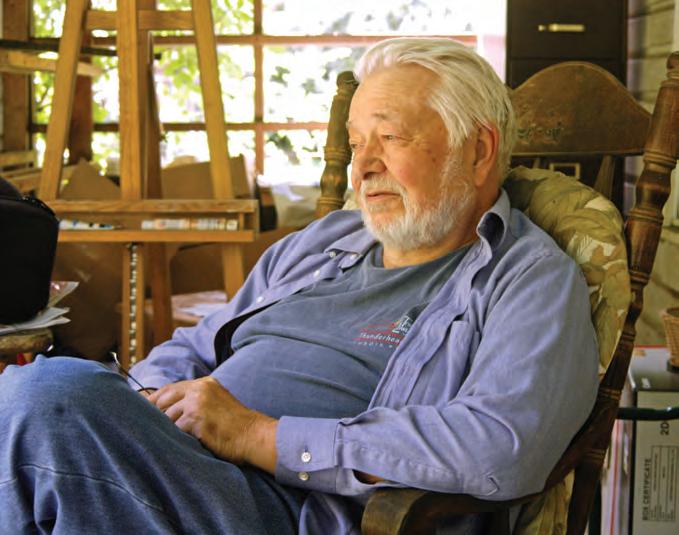
He’ll be joined at the premiere by Hutcheson and William Ritter, who wrote and performed music for the film, and author David Joy, whose works are rooted in Appalachian culture.
Sponsored by The Smoky Mountain News, the event is free and open to the public on a first come, first serve basis. The film is 90 minutes, with closed captioning. Carden’s public appearances have become increasingly rare and usually reach capacity quickly. The Jackson County Library is located at 310 Keener St. in Sylva.

 BY MADI ROSE SMN C ONTRIBUTOR
BY MADI ROSE SMN C ONTRIBUTOR
Woodworking newcomers Matt and Jessa Brantley have already made numerous statements with their eyecatching pieces. From garnering attention of local businesses who are in search of fine quality dining furniture to being led to teach turning at a nearby craft school, the artisans have already managed to fully immerse themselves in their craft in just two short years.
The Jackson County couple aims to showcase the natural beauty of wood, allowing the wood to guide them throughout their creative process. Within this process, the artists continually aim to share their joy and passion for their creations with others.
Two years ago, Matt did not consider himself an artist but admired how striking wood could be if adapted properly. Seeing this interest, Jessa enrolled Matt in an online woodworking course taught by craftsman Cam Anderson of Blacktail Studio in Portland, Oregon.
Finding inspiration from this artist and this course, Matt became obsessed with creating furniture that showcase the distinct features of natural wood.
“The more I did it [woodworking] and the better I got, I realized this level of quality is not often found,” Matt said.


The artist’s focus is creating aesthetic works with the purpose of being used. Specializing in dining furniture, he turns slabs of dried lumber into sprawling tabletops and intricately shaped serving trays. The onset of epoxy resin uses piqued Matt’s interest. After experimenting with the substance, he now incorporates it to solidify the formations of his designs.
Prior to the couple’s woodworking career, Jessa was adept in painting lettering on wooden signs. At the same time her partner delved into crafting objects of wood; Jessa was exposed to woodturning through social media. Learning and garnering knowl-

edge from internet sources, she immediately fell in love with creating bowls and was soon gifted her own lathe from Matt.

Jessa’s work specializes in burl wood, which results in an irregular grain or pattern in the material. She takes a philosophical approach to working with burl that she relates with life experiences.
“Most turners don’t like to work with burl because it doesn’t follow the rules and has lots of voids and bark inclusions, cracks,” Jessa said. “But, burl allows me the freedom to listen to the wood instead of listening to the world.”
The artist approaches the material with no expectations in a finished piece.
“When I started, I was trying to do what everybody else was doing…the goal was always these beautiful, perfect, repeatable, thin bowls…I got really frustrated at first and it wasn’t satisfying,” Jessa said.
Instead, she enjoys working in the moment and flowing with where the wood is taking her. Jessa considers her work geared toward aesthetic aim, stating her bowls are intended to evoke emotions, instead of utilitarian purposes.

Matt and Jessa showcase the natural beauties of wood through their work, and they strive to reclaim wood that would have otherwise gone to waste.
“One: it is better for the environment, like to not just go cutting down trees just to cut them down,” Matt said. “Two: It helps. We get to help our community.”
They detail that when someone makes them aware of a downed tree, they will offer to saw up the tree for them in exchange for creating artwork from the wood. From time to time in these situations, the artists will create works from the lumber and gift pieces of art back to the original owner.
A favorite story of the artists is an instance where they were able to rescue a piece of someone’s family history.
“This guy whose mom passed away had to sell her property because he wasn’t going



to live there. He posted on Facebook ‘I’m moving, trees for sale,’” Matt noted. “So, I presented him with a better offer. Instead of selling these trees, what if I cut them down and mill you some slabs and you can build a table out of it and have this memory of your mom forever?”
The artists are proud they are currently drying a slab of black walnut for the gentleman for him to carry the memory of his family forever.
Cultivating a sense of community with others is what the artists are setting out to build with their craft. One of Jessa’s goals is to create a shared studio space where woodworkers of the local area can come together and create work.
“In doing this, I have built so many relationships with people who are skilled and knowledgeable and have so much to offer the community,” Jessa said. “I’ve also met many people who have a passion for creating, but nowhere to do it…or they can’t afford it.”


With this, she aims to make woodcraft available to everyone, no matter age or financial status. Matt finds his sense of belonging in creating connections with individuals through his creations.
“I spend so much time and really invest in a piece. Four times now I’ve seen somebody look at that same piece and say ‘yes, I have to have this,’” Matt said.
A specialty area of his is custom building, where he states customers will feed him their dreams and it is his job to make them a reality.


Through the creation of their notable pieces, Matt and Jessa Brantley have exposed many individuals to the beauty of nature that surrounds us. By way of enhancing wood’s natural characteristics instead of trying to modify it, the couple continuously garners attention to the material’s innate capacity to be crafted into strong furniture for utilitarian needs or striking vessels to be displayed on a shelf.
For these artists, they have already reached significant milestones in their two years of woodworking and have no plans to stay stagnant in this endeavor.
To contact the Brantleys, visit their website at beloveddesignswoodworking.com. You can also find them on Instagram and Facebook: Beloved Designs Woodworking.

COME IN!!


Have a cold beer or wine and walk down memory lane




Balsam Range will play Canton Sept. 4. File photo
noted. 828.246.0350 or boojumbrewing.com.
• Concerts On The Creek (Sylva) will host Positive Mental Attitude (reggae/soul) Sept. 1 at Bridge Park in Sylva. All shows begin at 7 p.m. Everyone is encouraged to bring a chair or blanket. These events are free, but donations are encouraged. 828.586.2155 or mountainlovers.com/concerts-on-the-creek.
• Cowee School Arts & Heritage Center (Franklin) will host The Jeff Little Trio (Americana) 6 p.m. Sept. 16. Tickets are $15 for adults, $7.50 for kids 16 and under. For more information and/or to purchase tickets, go to coweeschool.org/music.
• Currahee Brewing (Franklin) will host “Music Bingo” 7 p.m. Thursdays, Bearded Blue Grass Sept. 1 and Dan Signor Sept. 2. All shows begin at 7 p.m. Free and open to the public. 828.634.0078 or curraheebrew.com.
Ramsey (singer-songwriter) Aug. 31, Whitewater Heathens Sept. 2, Joe Owens (singer-songwriter) Sept. 8 and Blue Jazz Band Sept. 9. All shows begin at 6 p.m. Free and open to the public. happsplace.com or 828.742.5700.
• Harrah’s Cherokee Casino Resort (Cherokee) will host Train (indie/soul) with Parmalee 8 p.m. Sept. 1 and Joan Jett & The Blackhearts (rock) 7:30 p.m. Sept. 9. For a full schedule of events and/or to buy tickets, caesars.com/harrahs-cherokee.
• Highlander Mountain House (Highlands) will host a Sunday Bluegrass Residency noon to 2:30 p.m. and the “Salon Series” with Hurray For The Riff Raff (Americana/indie) Sept. 21. Tickets are $35 per person. For more information and/or to purchase tickets, go to highlandermountainhouse.com.
Haywood County bluegrass sensation Balsam Range will headline the 115th Canton Labor Day gathering, which will take place Sept. 3-4 at Sorrells Street Park in downtown.

The live music will start at noon on both days. Balsam Range will hit the stage Sept. 4. Other acts to appear include Unspoken Tradition, The Crowe Brothers, Burnette Sisters, Joe Lasher & Kaitlin Baker and many more.
The Canton Labor Day Festival is a celebration of all things made in Western North Carolina. As the oldest festival of its kind in the south, Canton Labor Day honors the blue-collar workers who power our economy with their bare hands and deliver the products and services upon which we all depend.
Tickets are $8 for a two-day pass (purchased at Ingles through Sept. 2) and $5 at the gate each day. Kids ages 12 and under are admitted free. For more information, a full schedule of events and activities or to purchase tickets, go to cantonlaborday.com.
A community jam will be held from 67:30 p.m. Thursday, Sept. 7, at the Marianna Black Library in Bryson City. Anyone with a guitar, banjo, mandolin, fiddle, dulcimer or anything unplugged is invited to join. Singers are also welcomed to join in or you can just stop by and listen. The jam is facilitated by Larry Barnett of the Sawmill Creek Porch Band. The community jams offer a chance for musicians of all ages and levels of ability to share music they have learned over the years or learn old-time mountain songs. The music jams are offered to the public each first and third Thursday of the month — spring, summer, fall. This program received support from the North Carolina Arts Council, an agency funded by the State of North Carolina and the National Endowment of the Arts. 828.488.3030.
• Altered Frequencies (Franklin) will host semi-regular live music on the weekends. 828.342.8014 or alteredfrequencies.net.

• Farm At Old Edwards (Highlands) will host the “Orchard Sessions” featuring Olivia DaPonte (singer-songwriter) Sept. 14. All shows begin at 6 p.m. Tickets start at $25 per person. For tickets, go to oldedwardshospitality.com/orchardsessions.
• Folkmoot Friendship Center (Waynesville) will host semi-regular live music on the weekends. For a full schedule of events and/or to purchase tickets, go to folkmoot.org.
• Fontana Village Resort Wildwood Grill will host semi-regular live music on the weekends. Free and open to the public. 800.849.2258 or fontanavillage.com.
• Friday Night Live (Highlands) will host Byrds & Crows Sept. 1 and The Well Drinkers Sept. 8 at Town Square on Main Street. All shows begin at 6 p.m. Free and open to the public. highlandschamber.org.
• Highlands Performing Arts Center will host semi-regular live music on the weekends. For tickets, go to highlandsperformingarts.com.
• Innovation Brewing (Sylva) will host “Trivia Night with Kirk” from 7-9 p.m. every Monday, Open Mic Night every Wednesday and semiregular live music on the weekends. All shows begin at 7 p.m. unless otherwise noted. Free and open to the public. innovation-brewing.com.
• Innovation Station (Dillsboro) will host “Music Bingo” on Wednesdays and semi-regular live music on the weekends. All events begin at 7 p.m. unless otherwise noted. Free and open to the public. innovation-brewing.com.
• Lazy Hiker Brewing (Franklin) will host “Music Bingo” 6 p.m. Tuesdays, trivia 6:30 p.m. Wednesdays, Open Mic 6:30 p.m. Thursdays and semi-regular live music on the weekends. All shows begin at 7 p.m. unless otherwise noted. Free and open to the public. 828.349.2337 or lazyhikerbrewing.com.
• Balsam Falls Brewing (Sylva) will host an open mic from 8-10 p.m. every Thursday. Free and open to the public. 828.631.1987 or balsamfallsbrewing.com.
• Blue Ridge Beer Hub (Waynesville) will host a semi-regular acoustic jam with the Main Street NoTones from 7-9 p.m. every first and third Thursday of the month. Free and open to the public. For more information, go to blueridgebeerhub.com.
• Blue Stage (Andrews) will host The Hollerin’ Frogs 8 p.m. Sept. 23. 828.361.2534 or gm@thebluestage.com.
• Boojum Brewing (Waynesville) will host music bingo 7 p.m. Mondays, karaoke at 8:30 p.m. Wednesdays, trivia at 7 p.m., Supatight (rock/jam) Sept. 2 and Quickchester Sept. 9. All shows begin at 9 p.m. unless otherwise
• Frog Level Brewing (Waynesville) will host its weekly “Tuesday Jazz Series” at 5:30 p.m., Kid Billy (of Hustle Souls) 5:30 p.m. Aug. 31, Shane Meade Trio (indie/soul) Sept. 1, The Dirty French Broads (Americana/indie) 6 p.m. Sept. 2, Leman King (singer-songwriter) 3 p.m. Sept. 3, Jackson Grimm & The Bull Moose Party (Americana/indie) 3 p.m. Sept. 4, Kind Clean Gentlemen (rock/folk) 5:30 p.m. Sept. 5 and Tricia Ann Duo (rock/country) 5:30 p.m. Sept. 6. Free and open to the public unless otherwise noted. 828.454.5664 or froglevelbrewing.com.
• Frog Quarters (Franklin) will host live music from 11 a.m. to 1 p.m. Saturdays. Free and open to the public. Located at 573 East Main St. littletennessee.org or 828.369.8488.
• Groovin’ on the Green (Cashiers) will Hurricane Creek (rock/blues) Sept. 1. Shows begin at 6:30 p.m. Free and open to the public. Donations encouraged. villagegreencashiersnc.com/concerts.
• Happ’s Place (Glenville) will host Doug
• Lazy Hiker Brewing (Sylva) will host trivia 6:30 p.m. Wednesdays and an Old Time Jam 6:30 p.m. Thursdays. All shows begin at 8 p.m. unless otherwise noted. Free and open to the public. 828.349.2337 or lazyhikerbrewing.com.
• Lineside at Frog Level Brewing (Waynesville) will host semi-regular live music on the weekends. For more information and/or to purchase tickets, go to froglevelbrewing.com.
• Meadowlark Motel (Maggie Valley) will host Trivia Thursdays 6:30 p.m., Smoky Blue Rain (Americana/rock) Sept. 1, Andrew Wakefield (singer-songwriter) Sept. 2, Twelfth Fret Sept. 8 and Stomper Kitty Sept. 9. All shows begin at 7 p.m. unless otherwise noted. For more information and/or to purchase tickets, go to meadowlarkmotel.com or 828.926.1717.
• Moss Valley (Franklin) will host semi-regular live music on the weekends. Free and open to
the public. Food trucks and beverages available onsite. Bring a lawn chair. Presented by Drake Software.
• Mountain Layers Brewing (Bryson City) will host an “Open Mic with Frank Lee” Wednesdays, Alma Russ (Americana/indie) Aug. 25, Scott James Stambaugh (singersongwriter) Aug. 26 and Heidi Holton (blues/folk) 5 p.m. Aug. 27. All shows begin at 6 p.m. unless otherwise noted. Free and open to the public. 828.538.0115 or mountainlayersbrewingcompany.com.
• Music On The River (Cherokee) will host semi-regular live music on the Water Beetle Stage. For more information, go to visitcherokeenc.com and go to the “Events” tab.
• Nantahala Brewing Outpost (Sylva) will host semi-regular live music on the weekends. All shows begin at 8 p.m. unless otherwise noted. Free and open to the public. 828.641.9797 or nantahalabrewing.com.

• Nantahala Outdoor Center (Nantahala Gorge) will host Asheville Junction Sept. 1, Regatta 69 Sept. 2 and Beer & Loathing Sept. 9. All shows behind at 5 p.m. unless otherwise noted. Free and open to the public. noc.com/events.
• Pickin’ In The Park (Canton) will host Rick Morris Sept. 1. Local clogging groups will also be onsite to perform. Shows are 6-9 p.m. at the Canton Rec Park located at 77 Penland St. Free and open to the public. Cantonnc.com.
• Pickin’ On The Square (Franklin) will host Sundown (classic rock) Sept. 9. All shows begin at 6 p.m. at the Gazebo in downtown. Free and open to the public. franklinnc.com/pickin-on-the-square.html.
• Quirky Birds Treehouse & Bistro (Dillsboro) will host Open Mic Night at 7 p.m. Tuesdays and semi-regular live music on the weekends. Free and open to the public. 828.586.1717 or facebook.com/quirkybirdstreehouse.
• Rathskeller Coffee Haus & Pub (Franklin) will host semi-regular live music on the weekends. Shows begin at 8 p.m. Free and open to the public. 828.369.6796.

• Salty Dog’s Seafood & Grill (Maggie Valley) will host “Karaoke with Russell” every Monday and semi-regular live music on the weekends. Free and open to the public. 828.926.9105.
• Satulah Mountain Brewing (Highlands) will host semi-regular live music on the weekends. 828.482.9794 or satulahmountainbrewing.com.
• Saturdays On Pine (Highlands) will host Continental Divide Sept. 2 at KelseyHutchinson Park on Pine Street. All shows begin at 6 p.m. Free and open to the public. highlandschamber.org.
• The Scotsman (Waynesville) will host a “Celtic Jam” 2-5 p.m. Sundays, Borderline Band (country) Aug. 31, Tricia Ann Band (rock/country) Sept. 1 and Bridget Gossett (rock/blues) Sept. 7. All shows begin at 8 p.m. unless otherwise noted. Free and open to the public. 828.246.6292 or scotsmanpublic.com.
• SlopeSide Tavern (Sapphire) will host The ALR Trio 6 p.m. Sept. 7. All shows begin at 7 p.m. unless otherwise noted. Free and open to the public. 828.743.8655 or slopesidetavern.com.
• Smoky Mountain Center for the Performing Arts (Franklin) will host Departure (Journey tribute) Sept. 9. All shows begin at 7:30 p.m. unless otherwise noted. For more information and/or to purchase tickets, go to smokymountainarts.com or 828.524.1598.
• Stecoah Valley Center (Robbinsville) will host semi-regular live music on the weekends. All shows begin at 7:30 p.m. unless otherwise noted. For more information and/or to purchase tickets, call 828.479.3364 or go to stecoahvalleycenter.com.
• Swain Arts Center (Bryson City) will host The Legacy Motown Revue (soul/R&B) 6 p.m. Sept. 2-3. Advance tickets are $15 for adults, $12 for students. For more information and/or to purchase tickets, go to swainartscenter.com.
• The Ugly Dog Pub (Highlands) will host “Bluegrass Wednesday” at 6:30 p.m. each week. 828.526.8364 or theuglydogpub.com.
• Unplugged Pub (Bryson City) will host TNT Aug. 30, Mountain Gypsy (Americana) Aug. 31, Jon Cox (country/rock, $5 cover charge) Sept. 1, Carolina Freightshakers (classic rock, $5 cover charge) Sept. 2, JR Williams Sept. 6, Blackjack Country Sept. 7, Zak Saltz Band ($5 cover charge) Sept. 8 and Keil Nathan Smith & The Sudden Change Band ($5 cover charge) Sept. 9. All shows are free and begin at 8 p.m. unless otherwise noted. 828.538.2488.
• Valley Cigar & Wine Co. (Waynesville) will host semi-regular live music on the weekends. Free and open to the public. 828.944.0686 or valleycigarandwineco.com.
• Valley Tavern (Maggie Valley) will host semiregular live music on the weekends. All shows begin at 6 p.m. unless otherwise noted. Free and open to the public. 828.926.7440 or valley-tavern.com.
• Whiteside Brewing (Cashiers) will host Amongst The Trees Sept. 1, Seth & Sara Sept. 2 and Shane Meade (indie/soul) 1 p.m. Sept. 10. All shows begin at 6 p.m. unless otherwise noted. 828.743.6000 or whitesidebrewing.com.
• Yonder Community Market (Franklin) will host Wyatt Espalin (singer-songwriter) 7 p.m. Sept. 9 and Dalton Mills (singer-songwriter) 4 p.m. Sept. 24. For more information and/or to purchase tickets, go to eatrealfoodinc.com.

Singer-songwriter Andrew Wakefield will perform at 7 p.m. Saturday, Sept. 2, in The Speakeasy at the Meadowlark Motel in Maggie Valley.
Wakefield is an Asheville artist with an extensive and eclectic catalog of compositions ranging from guitar-driven bluegrass to folk, old-time, newgrass, rock, Americana, and more.
Boasting an exceptional knack for song-craft and a boundless passion for the guitar, Wakefield has fast become a local fixture, while word of his talent continues to spread throughout the Southeast and beyond.
Wakefield is also a contributing member of The Well Drinkers and a former member of Supper Break and Cynefin.
Career highlights include appearing at Merlefest, performing with Molly Tuttle and Ketch Secor of Old Crow Medicine Show, members of Billy Strings, Town Mountain, Fireside Collective, Songs From the Road Band, Jon Stickley Trio, Larry Keel & Natural Bridge, George Clinton and Jeff Sipe, among others.
The show is free and open to the public. For more information, go to meadowlarkmotel.com or 828.926.1717.
The Town of Sylva, Jackson County Parks and Recreation Department and Jackson County Chamber of Commerce are proud to present the 14th annual season of the “Concerts on the Creek” music series.
Rock/reggae act Positive Mental Attitude will hit the stage at 7 p.m. Friday, Sept. 1, at the gazebo in Bridge Park in downtown Sylva.
“Our music is full of inspiration from these mountains. Water, mountain landscapes, nature, trails. They all take part in the inspiration process for us. We are proud to call Sylva home and our sound could not be what it is without this town,” said PMA guitarist Miller Watson. “It’s also really cool to see the similarities in bluegrass music and reggae and how they took shape from the development of
African banjo. It’s also nice to bring a touch of reggae to these mountains.”
These events are free with donations encouraged. Everyone is welcome. Dogs must be on a leash. No smoking, vaping, coolers or tents allowed. Bring a chair or blanket. There will be food trucks onsite for this event.
These concerts are organized and produced by the Jackson County Chamber of Commerce, the Town of Sylva and the Jackson County Parks and Recreation Department.
For more information, please contact the Jackson County Chamber of Commerce at 828.586.2155 or visit the Concerts on the Creek Facebook page. A full schedule of dates and performers can be found at mountainlovers.com/concerts-on-the-creek.

The exhibition “Spark of the Eagle Dancer: The Collecting Legacy of Lambert Wilson” will be showcased through Dec. 8 in the Fine Art Museum at Western Carolina University in Cullowhee.
The exhibit features over 140 works of contemporary Native American art from the collection of one of Western North Carolina’s most notable art enthusiasts, the late Lambert Wilson.
He devoted his life to supporting and encouraging Native artists, amassed an extensive collection of over 6,000 objects during his lifetime, focusing primarily on artists of the Eastern Band of Cherokee

Indians, Cherokee Nation and sovereign nations of the Southwest.
This exhibition brings together a selection of baskets, pottery, carving, painting, photography, and more that tell the story of the relationships Wilson built and the impact that he made by dedicating himself to this remarkable collection.
“Spark of the Eagle Dancer” gives visitors a glimpse into this vast collection built over 47 years and features work by 83 artists of various tribal affiliations.
A cherished gathering of locals and visitors alike, “Art After Dark” will take place from 6-9 p.m. Friday, Sept. 1, in downtown Waynesville. Each first Friday of the month (MayDecember), Main Street transforms into an evening of art, live music, finger foods, beverages and shopping as artisan studios and galleries keep their doors open later for local residents and visitors alike.
The reception for Spark of the Eagle Dancer will take place from 5-7 p.m. Wednesday, Aug. 30, at the Fine Art Museum. This event will include a gallery talk, along with complimentary hors d’oeuvres and drinks. Free parking is available. To learn more about the exhibition and reception, please go to arts.wcu.edu/spark. The Fine Art Museum is open from 10 a.m. to 4 p.m. Tuesday through Friday and 10 a.m. to 7 p.m. Thursday. ALSO:
• Maggie Valley Labor Day Arts & Crafts Show will be held Sept. 2-3 at the Maggie Valley Fairgrounds. The event will feature numerous vendors, food trucks and much more. For more information, go to maggievalleyfestivalgrounds.com.
• Gallery Zella (Bryson City) will be hosting an array of artist receptions, exhibits and showcases. The gallery is open from noon to 5 p.m. Wednesday through Saturday. For more information, go to galleryzella.com or call 517.881.0959.

• “Summer Artisan Market” will be held from noon to 5 p.m. on the second Saturday of every month through September at the Nantahala Outdoor Center (NOC) in Nantahala Gorge. Free and open to the public. noc.com/events.
• Call for artists and musicians for the “Youth Arts Festival” from 9 a.m. to 3 p.m. Saturday, Sept. 16, at the Jackson County Green Energy Park in Dillsboro. Artists needed to demonstrate, as well as musicians to perform. If interested, email chelseamiller@jacksonnc.org or call 828.631.0271.
• Waynesville Photography Club meets at 7 p.m. every third Monday each month on the second floor of the Haywood Regional Health & Fitness Center in Clyde. The club is a nonprofit organization that exists for the enjoyment of photography and the improvement of one’s skills. They welcome photographers of all skill levels to share ideas and images at the monthly meetings. For more information, email waynesvillephotoclub@charter.net or follow them on Facebook: Waynesville Photography Club.
The event is free and open to the public. For more information, go to downtownwaynesville.com.

• Summer Artisans Market will be held from 6:30-8:30 p.m. on the second Saturday of the month through September at the Nantahala Outdoor Center. Artisan vendors and more. For more information, go to noc.com.
• Farmer’s Market (with artisans) will be held from 9 a.m. to 2 p.m. on Fridays and Saturdays through October at 117 Island St. in Bryson City. Stop by the old barn by the river for local, homegrown produce, as well as baked goods, jellies and preserves, authentic crafts and more. Food truck, picnic tables and live music. Leashed pets are welcome. Outdoor event. 828.488.7857.
• Haywood County Arts Council (Waynesville) will offer a wide range of classes, events and activities for artisans, locals and visitors. The HCAC gallery is open seven days a week from 10 a.m. to 5 p.m. and 11 a.m. to 4 p.m. Sundays. For more information and a full schedule, go to haywoodarts.org.
• Jackson County Green Energy Park (Dillsboro) will be offering a slew of classes, events and activities for artisans, locals and visitors. For more information and a full schedule, go to jcgep.org.
• Southwestern Community College Swain Arts Center (Bryson City) will host an array of workshops for adults and kids. For more information on the upcoming classes and/or to sign-up, go to southwesterncc.edu/scclocations/swain-center.
• Dogwood Crafters in Dillsboro will offer a selection of upcoming art classes and workshops. For more information and a full schedule of activities, go to dogwoodcrafters.com/classes or call 828.586.2248.


The next “Thunder in the Smokies” rally will be held Sept. 8-10 at the Maggie Valley Fairgrounds.
The oldest and largest motorcycle rally in the Great Smoky Mountains, the weekend celebration will feature live music, dozens of

vendors, motorcycle shows/games, prizes and much more.
For more information, a full schedule of events and/or to purchase tickets, go to thunderinthesmokies.com.



The Cherokee Bonfire & Storytelling will be held from 7-9 p.m. Sundays, Mondays, Wednesdays and Saturdays through Oct. 31 at the Oconaluftee Islands Park in Cherokee.

Sit by a bonfire alongside a river and listen to some of Cherokee’s best storytellers. The bonfire is free and open to the public.
For more information, call 800.438.1601 or go to visitcherokeenc.com. File photo
The Smoky Mountain Roller Girls will host their “Barbie Bout” match against Greensboro Roller Derby on Saturday, Sept. 9, at the Swain County Recreation Center in Bryson City.

The team competes in an amateur women’s athletic roller derby league that aims to provide an outlet for fun, fitness and camaraderie among its members and develop athletic ability and teamwork. SMRG endeavors to give back to the community that supports them through community building initiatives and charitable donations of time and activity.
Doors open at 4 p.m. with the first whistle at 6 p.m. Tickets are $5 presale or $8 at the door (cash or Venmo accepted). Kids
ages 11 and under are free. Proceeds from ticket sales will benefit “Together We Rise.”
As well, are you interested in becoming a skater, referee or non-skating official? SMRG
has open practices. No experience necessary. Bring your own chair. For more information, go to facebook.com/smokymountainrollergirls.

‘Spamalot’ will be at HART on select dates through mid-September. Donated photo

A production of the beloved Monty Python comedy “Spamalot” will take the stage at 7:30 p.m. Sept. 1-2, 8-9, 1416 and 2 p.m. Sept. 3, 10 and 17 at the Haywood Arts Regional Theatre in Waynesville.

The 2005 Tony Award-winner for “Best Musical,” Monty Python’s “Spamalot” is a musical comedy frequently quoted as being “lovingly ripped off” from the 1975 film “Monty Python and the Holy Grail,” which tells the legendary tale of King Arthur’s quest to find the Holy Grail.
As you’d expect from Eric Idle of Monty Python fame, the musical diverts from more traditional versions of the legend, offering a highly irreverent parody of the legend of King Arthur. We can never have too much laughter and this goofy, high-energy musical offers up more laughs than ever.
The show features now-famous songs including “Always Look on the Bright Side of Life,” “The Song That Goes Like This” and “Find Your Grail.”
At the start, the show begins with a miscommunication between the actors and the narrator, leading into a song about Finland instead of England. From there the show introduces a myriad of characters you’d expect to be in the legendary tale, but with many twists — from modern to absurd.
To make reservations, call the HART Box Office at 828.456.6322 or go to harttheatre.org to make reservations online. HART Box Office hours are noon to 5 p.m. Tuesday through Friday.
• “Apple Fest” will kick off at 10 a.m. Saturday, Sept. 2, at Darnell Farms in Bryson City. Food trucks, live music, vendors, bounce houses, kids’ activities, bobbing for apples contest, dream whips, caramel apple station and more. For more information, email hotheadevents@gmail.com.
• “Flights & Bites” will be held starting at 4 p.m. on Thursdays and Fridays at Bosu’s Wine Shop in downtown Waynesville. For more information on upcoming events, wine tastings and special dinners, go to waynesvillewine.com.

• “Take A Flight” with four new wines every Friday and Saturdays at the Bryson City Wine

The “Unto These Hills” stage production will be held at 8 p.m. nightly throughout the summer at the Cherokee Mountainside Theatre.
This decades-old acclaimed outdoor drama traces the Cherokee people through the eons, through the zenith of their power, through the heartbreak of the Trail of Tears, finally ending, appropriately, in the present day, where the Cherokee people, much like their newly re-scripted drama, continue to rewrite their place in the world — a place based on traditional Cherokee values and modern sensibilities.

Pre-show entertainment begins at 7:30 p.m. Gates open at 7 p.m. For more information on show dates and/or to purchase tickets, go to visitcherokeenc.com and click on the “Events” tab.
Market. Select from a gourmet selection of charcuterie to enjoy with your wines. Educational classes and other events are also available. For more information, call 828.538.0420.
• “Uncorked: Wine & Rail Pairing Experience” will be held from 11 a.m. to 3 p.m. on select dates at the Great Smoky Mountains Railroad in Bryson City. Full service all-adult first class car. Wine pairings with a meal, and more. There will also be a special “Beer Train” on select dates. For more information and/or to register, call 800.872.4681 or go to gsmr.com.




This one’s going to be interesting. I’ve got a book whose author lives right down the road. David Joy and I both live in Tuckasegee, here in Jackson County, and his new novel “Those We Thought We Knew” (Putnam, 2023, 388 pages) takes place right here and with all the familiar places and faces — Pressley, Hooper, Allison, Dill, Luker, Darnell, Bates.


So, that when you’re reading it, you might think you’re reading a Thomas Wolfe novel. And like Wolfe, so vibrant are the colors of his descriptive prose that you want to believe you’re reading documentary non-fiction about what took place here in 2019, which is when this novel is set. Just hope Joy doesn’t get the same kind of local push-back as was the case with Wolfe. But, as the saying goes, “write what you know” and David Joy definitely knows Jackson County by now and Jackson County knows him, having written several novels that take place here.
So, from Tuckasegee, down N.C. 281 we go to N.C. 107 and into town. Stopping at Tuck Traders for a few necessities, Mt. Zion AME church in Cullowhee for an Amen, and the Coffee Shop in Sylva for lunch. But this is not a travel book, it’s crime fiction that reads a little like Agatha Christie meets Cormac McCarthy. Joy has become a good storyteller, has learned from his own personal writing experience and from some of the best fiction writers and has perfected his writing style. His short chapters and his poetically descriptive narrative keep the reader engaged (In fact, I read this almost 400-page book in two sittings).



I loved the way he uses the first half of the novel to introduce us to the local characters and landscape so that you feel as though you know the expanded history of the people and the place. We get the Southern Appalachian dialect, the Plott hounds, the unmufflered old trucks sporting Confederate flags, the white lightnin’... I’ve been living in Jackson County for 40 years and so know Jackson County well, but I’m beginning to think that the young David Joy knows it better than I do. He’s come a long way since his first book, “Growing Gills: A Fly-Fisherman’s Journey.” Now, he’s a best-selling and awardwinning author with a global reputation. Kudos to him and his focus and discipline that fuels writing that keeps getting better with each new book.
But I digress. “Those We Thought We Knew” is a crime novel that is about the three Rs: race, religion and real estate. The main storyline begins at a protest rally at the Confederate monument on the steps to the old courthouse building in downtown Sylva, with members of the KKK and the counterculture anti-protesters battling it out for
supremacy. In this case white supremacy, which results in the eventual death of a young black woman named Toya Gardner, who is an artist who professes that “art is an instrument of social change” and who was participating in the rally. With the KKK hav-


Jackson County Black community, and detective Green, who is investigating a plethora of possible suspects, all with potential yet illusive motives. “The only suspects so far were a nut job who’d turned over his house to a rat snake, a grumpy old cuss who’d been riding a grader too long, and a college kid who had no motive other than a summerlong crush,” Joy writes. From here, Joy hones in on the Southern reality of “submission vs. survival” as described by grandma Vess, who says, “Each one of us has to live our own truth,” and goes on to speak of the process of grief.
“Grieving was an individual process, and the only constant was time. There was no right or wrong way and there was no assurance that you would ever heal.”
ing “traded in their robes for business suits” in this 2019 scenario, local self-made “pride matters less than power” real estate businessman Slade Ashe becomes a central character as the Jackson County Sheriff John Coggins and his deputies try and solve the murder case. As a kind of mountain man Hercule Poirot, Coggins already has the novel’s “bad boy” — an out-of-towner KKK member named William Dean Cawthorn — locked up in the county jail on suspicion of murder. His detective, Leah Green, on her first case right out of college, is working the county trying to come up with pertinent clues to solidify the case against Cawthorn. Right when she thinks she’s solved the case, new evidence emerges which sets Cawthorn free from jail. And, as they say, the plot thickens.
From here on out we get a 50/50 perspective from both the Black and the white communities with the character of Toya’s grandmother, Vess Jones, the matriarch of the



And, here, we also have Leah’s epiphany related to this case, from which the book’s title is taken: “People like Cawthorn were the easy ones. But it was the ones we thought we knew, those were the ones who broke our hearts.” And with this quote, we’re set up for the book’s surprise ending.
But the real surprise ending is what David Joy has done with this book, which seems a pivotal point in his writing life. He’s made a leap of revitalization to a reverence for the sacredness in life and the need to recognize that level of personal awareness, as well as that regarding racial equality. “Those We Thought We Knew,” in the end, is about an enlightened insight into the human condition and that’s what, suspense aside, I think he’s ultimately writing about in this book.


Late last month, I was lucky enough to catch a special musical performance in Great Smoky Mountains National Park. It was a fine morning in high summer, and on the back porch of the Oconaluftee Visitor Center near Cherokee, a four-piece string band launched into the first swirling notes of an original composition. Holding the center of the stage and letting his banjo ring out over the supporting guitar and bass was the group’s leader, Tray Wellington.
Originally from Western North Carolina and currently based in Raleigh, Trajan “Tray” Wellington is a rising star in the world of contemporary bluegrass. Through his performances at national bluegrass festivals, touring with the band Cane Mill Road, and the release of his latest album, “Black Banjo” (2022), under his own name, Wellington has been steadily gaining the attention of his peers thanks to his technical mastery of the banjo as well as his forward-leaning embrace of influences that stretch traditional bluegrass into the realms of jazz and contemporary rap and hip hop.
Twice, in 2022 and 2023, Wellington has been named a finalist for the International Bluegrass Music Association’s “New Artist of the Year” award, and in 2019, he received the association’s “Momentum Instrumentalist of the Year” award. As a young Black artist working within a genre historically dominated by White musicians, he has also been featured on CNN’s “United Shades of America.” The Tray Wellington Band’s performance in the Smokies was part of a celebration hosted by the park’s African American Experiences in the Smokies project — an ongoing initiative begun in 2018 to uncover and share previously untold stories of Black life in and around the park.

“I love this area,” Wellington told me after the show. “It’s where I’ve learned a lot of music and met a lot of people I still work with today. It’s still very important to me and somewhere I still consider home just as much as Raleigh.”
Having grown up in Ashe County, located north of Boone, Wellington remembers making regular day trips to the Great Smoky Mountains and passing through Wilkesboro on his way to pick apples with his grandfather.
“Some of my earliest memories are in the Smokies just riding through and listening to music on the way up and making a whole day out of it,” said Wellington. “My grandpa never played music, but we were always listening, and it kind of gave me a love for music. We’d listen to a little bit of rock, a little country, some western swing stuff, some bluegrass — a little bit of everything.”
Echoes of that eclectic listening can still be heard within Wellington’s albums and live sets. While his original compositions generally fall into the realm of progressive bluegrass or bluegrass-jazz fusion, he might also choose to include a traditional fiddle tune like “Half Past Four,” a rendition of a jazz classic like “Naima” by John Coltrane, or a cover of something more contemporary like Kid Cudi’s “Pursuit of
Happiness.” As he curates each release and performance, Wellington takes care to draw on traditions while also pushing the boundaries of what audiences might typically expect of a bluegrass band.
“We don’t want to lose these songs. It’s part of carrying those traditions on,” said Wellington. “Also, people want to be able to know a song every now and then. If you do a song they know, they’re more willing to have an open ear to what you’re doing.”
On the other side, Wellington is especially conscious of the need to reach younger listeners and those, like himself, who haven’t always seen themselves reflected in the bluegrass tradition.

“There’s still this lack of representation within bluegrass,” said Wellington. “When it comes to people of color, LGBTQ+ people, people from different backgrounds, there aren’t many artists in bluegrass trying to bring that in.”

Working in a cover of an artist like Kid Cudi into his set is a way Wellington can honor his own diverse musical interests while also building a bridge to new audiences.

“That’s what folk music is, you know?” said Wellington. “It’s music that brings peoples together from all different backgrounds.”
The Appalachian landscape itself is also a perennial source of inspiration for Wellington and his bandmates.
“If we’re trying to do a writing session we’ll try to get away and go to some place that’s beautiful,” said Wellington. “You need to find that calm place.”
As my conversation with Wellington came to a close, an elk buck galloped across the open field where his audience had just been
standing. Soon after, a rooster wandered over from the park’s Mountain Farm Museum to let out a cheerful crow in the sun.
“This is an amazing spot to play music,” said Wellington. “All kinds of people are coming here every day — it’s a great opportunity.”
Wellington’s performance at Oconaluftee was thanks in large part to Antoine Fletcher, the park’s science communicator and the lead of the African American Experiences in the Smokies project that coordinated the event with the financial support of park partner Friends of the Smokies.
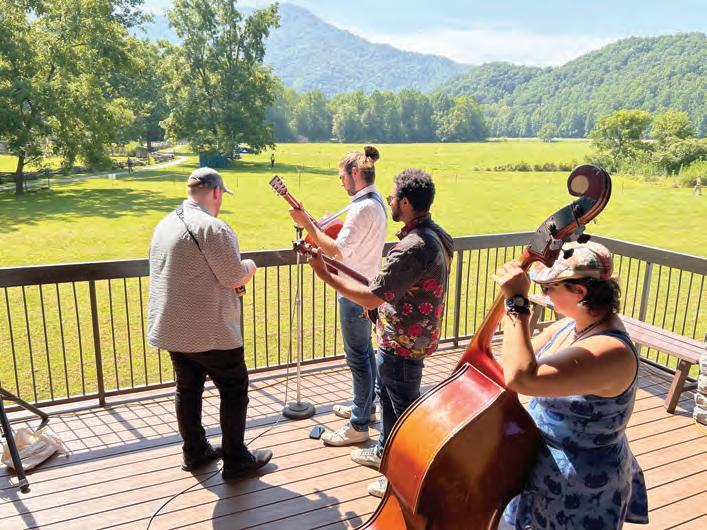
“As I stood there in the heart of Appalachia and listened to Tray play his latest album, ‘Black Banjo,’ I immediately understood the importance of the connection of African Americans and Appalachian music,” said Fletcher. “The way he plays is not from days of training but from his lived experiences in the mountains. Every strum of the banjo tells his story and deep connection to the Smokies.”
An interview Fletcher conducted with Wellington on the day of the concert will be shared soon on the park’s growing African American Experiences oral histories webpage. To learn more about the project and listen to other oral histories, find the project page at nps.gov/grsm under “Learn About the Park” or via the direct link at nps.gov/grsm/learn/historyculture/africanamerican-experiences-in-the-smokies-project.htm.
(Aaron Searcy is lead editor for the 29,000member Great Smoky Mountains Association, a supporting partner of the African American Experiences in the Smokies project. Reach him at aaron@gsmassoc.org.)






According to the recently released results of the National Park Service’s newest peer-reviewed visitor spending analysis, in 2022 North Carolina was yet again home to the nation’s two top parks for visitor spending — the Blue Ridge Parkway and the Great Smoky Mountains National Park.
The parks were two of only four NPS units to break the $1 billion mark in visitor dollars spent in communities near the parks. The study shows that Smokies visitors spent $2.1 billion in local communities while Parkway visitors spent nearly $1.3 billion. Despite both the Parkway and the Smokies sharing their visitor spending total between two states, visitor spending in North Carolina propelled the state to have the second highest total at $2.5 billion, right behind California with $2.7 billion. Tennessee was fourth with $2.1 billion.
Total spending from Smokies visitors jumped to $2.1 billion in 2022 from $1.3 billion in 2021, an increase due at least partially due to the most recent analysis incorporating new survey data from the park. Previous spending estimates were calculated by using generalized trip and spending data
The Waynesville Recreation Center will close for its annual maintenance week Monday, Sept. 4, through Tuesday, Sept. 12. When it resumes normal hours Sept. 13, it will do so with an expanded schedule for the lap pool and water park.
from other parks, but the new survey data shows that Smokies visitors stayed longer in gateway communities and spent more
money than generalized estimates indicated. This year the analysis also attributes a more conservative portion of time and
spending if the park was not a person’s primary reason for visiting the area.
Lodging accounted for the biggest chunk of visitor spending, at 47%, followed by restaurants at 17% and recreation and retail, each of which accounted for about 10%. In addition to the estimated $2.1 billion of direct spending, the study estimated that the park had a total economic output of $3.3 billion and supported 32,590 local jobs.
The Blue Ridge Parkway’s estimated $1.3 billion in visitor spending brings it even with 2021, when spending was also estimated at $1.3 billion. Lodging accounted for 44% of that figure, followed by restaurants at 22% and gas at 12%. The study estimated that the Parkway’s total economic output, including secondary effects, was $1.7 billion, and that it supported 17,800 local jobs.
Nationwide, national park units spurred $23.9 billion in direct spending, supporting 378,400 jobs, of which 314,600 jobs were found in gateway communities. The cumulative benefit to the U.S. economy was $50.3 billion, the study found.
An interactive tool allowing users to explore the new data, along with year-byyear trend data, is available at nps.gov/subjects/socialscience/vse.htm.
 —
—
Starting Sept. 13, the lap pool will be open 7 a.m. to 7:30 p.m. Monday through Friday and 8 a.m. to 3:30 p.m. Saturdays. The water park will be open noon to 4 p.m. Wednesdays, 3:30-7:30 p.m. Fridays and 11:30 a.m. to 3:30 p.m. Saturdays. It will also be open 9:30-11:30 a.m. Fridays exclusively for children under 6 years old
For more information, contact Luke Kinsland at lkinsland@waynesvillenc.gov or 828.456.2030.

Indian Boundary Campground in the Cherokee National Forest near Tellico Plains, Tennessee, is now closed due to damage from a flash flood on Aug. 14. The storm also prompted a temporary closure of the Cherohala Skyway, which increased emergency response times to the campground. The campground will remain closed until the Skyway reopens.

Advance tickets are now on sale for the N.C. Mountain State Fair, slated for Sept. 8-17 at the Western North Carolina Agricultural Center in Fletcher.

Tickets are $9 for adults 13-64 and $5 for children 6-12 when purchased in advance, or $12 for adults and $7 for children when purchased at the gate or online starting Sept. 8. Seniors 65 and older can buy tickets for $5 regardless of when they purchase them.
Fairgoers can also save money by taking advantage of discounts on selected days. On opening day Friday, Sept. 8, admission is free for students in kindergarten through 12th grade until 6 p.m. A donation of five canned goods earns free admission Wednesday, Sept. 13, for We CAN Fight Hunger Day presented by Ingles and the N.C. Mountain State Fair. Admission is free through 6 p.m. Friday, Sept. 15, for K-12 students and seniors 65 and older.
This year, advance tickets are not available for fair rides, but hand stamps for unlimited rides will be available every day at the fair for $25, or $35 Fridays, Saturdays and Sundays.
New attractions at the fair this year include racing and swimming pigs, splashing sea lions and a swirling and spinning new spectacular ride. For more information, visit mountainstatefair.com.
The 13th annual Dazzling Dahlia Festival will be held Saturday, Sept. 9, in Highlands. The event will feature floral vignette displays throughout Highlands and entrants in the single bloom competition at The Bascom.

Storytelling, music, food, local authors and flower arrangements for sale

Look behind the scenes of a land conservation project with a presentation at 7 p.m. Wednesday, Sept. 6, at Manheimer Auditorium at the University of North Carolina Asheville, and via Zoom.
Offered through the WNC Sierra Club, the presentation will feature land conservationist Kyle Shute of the Southern Appalachian Highlands Conservancy and former N.C. Rep. John Ager. Shute will outline the SAHC’s conservation strategies and its history of land conservation in the region, while Ager will talk about creating his own conservation easement at Hickory Nut Gap Farm.
For more information, or to register for the Zoom link, visit wncsierraclub.org.
The hunting season for mourning and white-winged doves opens Saturday, Sept. 2, and will be separated into three segments.


Hunting may occur Sept. 2 through Oct. 7, Nov. 11-25 and Dec. 9 through Jan. 31, 2024. The daily bag limit is 15 mourning or white-winged doves, either as single species or combined, and shooting hours are from 30 minutes before sunrise to sunset. Hunting of migratory game birds, including doves, by any method is not allowed on Sundays. It is illegal to dove hunt with a shotgun that can hold more than three shells, unless it is plugged with a one-piece filler incapable of removal without disassembling the gun, so its total capacity does not exceed three shells.
Migratory game bird hunters, including lifetime license holders, are required to register in the federal Harvest Information Program, a survey method developed by the U.S. Fish and Wildlife Service to collect more reliable estimates of migratory game bird harvests throughout the country. HIP certification is available July 1-April 1 and expires June 30 each year.
To purchase a license, visit license.gooutdoorsnorthcarolina.com.
will take place at Highlands Historical Village, 11 a.m. to 2 p.m. Also at the village, Gary Wein will offer a talk, “A Sense of Place,” at 2 p.m. and Nitrograss will play with a special guest 3-5 p.m. The festival will wind up 6-9 p.m. at Kelsey Hutchinson Founders Park with a concert featuring Steel Toed Stilettos and the announcement of festival winners.
The festival is a fundraiser for the Highlands Historical Society. Learn more at highlandshistory.com/dahlia-festival.

ONE NIGHT ONLY

2 pm

Filmed over the past 25 years, STORYTELLER is more than just a documentary about one of Western North Carolina’s most revered literary figures — it’s a touching tribute to the lore, folklore, superstitions and tall tales of the region, and their most enthusiastic guardian. 90 minutes, with closed captioning.
Featuring William Ritter SINGER/SONGWRITER

David Joy AUTHOR special guest Neal Hutcheson
EMMY AWARD-WINNING FILMMAKER AND AUTHOR OF “POPCORN SUTTON: MOONSHINER”
Complimentary refreshments from Sylva’s City Lights Cafe
Sponsored by: The Smoky Mountain News | Hosted by: SMN’s Cory Vaillancourt Seating is first come, first serve.


These are only the answers.
Delve into the captivating world of wildlife during a 60-minute interactive experience starting at 10:30 a.m. Saturday, Sept. 2, at the Nantahala Outdoor Center in Swain County.
Support Haywood Waterways Association and Big Brothers Big Sisters of Haywood County during the annual Trout Race slated for 2 p.m. Saturday, Sept. 9, at BearWaters Brewing in Canton.
Each trout is made of wood, cut by students in the Haywood Community College Woodworking Program and labeled with a number. That number is tied to a ticket, and
Hosted by the WNC Nature Center, “Fur, Feathers and Scales” will offer an exploration of furs, skulls and various animal artifacts — plus the chance to meet and greet two extraordinary animal ambassadors. Free. Learn more at noc.com/events.

the first several trout to cross the finish line will win prizes for their ticket holders. The first place prize is a restored bamboo rod by Thomas Custom Rods valued at $1,500. Additional prizes include gift cards to local businesses, two adult bikes and one inflatable kayak.
Ticket price is $10 per trout. Event check-in starts at 1 p.m., the race starts at 2 p.m. and the event ends around 3 p.m. Winners need not be present. If the river is too high to successfully hold the race, winners will be decided using a drawing instead. Learn more or enter at troutrace.org.
Learn how to fly fish with the Tuckasegee Chapter of Trout Unlimited 4-8 p.m. Tuesday, Sept. 5, at East LaPorte Park in Jackson County.
The evening will feature a cookout and some time on the river, with newcomers welcome. TU members will be available for casting tips, demonstrations and anything related to fishing, casting or gear. Loaner gear will be available, including some waders. Casting can be done on the grass or from the bank for those who want to stay dry.
RSVPs are requested to tu.myeventscenter.com/event/tu-sylva-open-house-september-5-82932.
• The Jackson County Farmers Market meets every Saturday November through March 10 a.m. to 1 p.m. and April through October 9 a.m. to noon at Bridge Park in Sylva, 110 Railroad St. Special events listed on Facebook and Instagram.
• The Jackson Arts Market takes place from 1-5 p.m. every Saturday at 533 West Main St. in Sylva with live music and an array of local artists.
• Sarge’s 18th Annual Downtown Dog Walk will take place at 10 a.m. Saturday, Sept. 23, in Waynesville. Preregistration for walkers and their dogs will take place 12-6 p.m. Sept. 21, at Sarge’s Animal Rescue Foundation. On-site registration will take place at the courthouse before the parade kickoff. Registration is $25 for adults, $!5 for children. For more information visit sarges.org.
• Mountain Area pregnancy Services and the WIC Breastfeeding Peer Counselor work together to provide a casual support group for prenatal and breastfeeding individuals from 1-2 p.m. on Tuesdays at Mountain Area Pregnancy Services, 177 N Main St. Waynesville, NC. All are welcome, registration is recommended. For more information, please call 828.558.4550.
• Chess 101 takes place 3:30-4:30 p.m. every Friday at the Canton Branch of the Haywood County Library. For more information, email Ashlyn Godleski at ashlyn.godleski@haywoodcountync.gov or call 828.356.2567.
• The Canton Branch of the Haywood County Public Library Creative Writing Group meets 10:30 a.m. to noon on the second and fourth Tuesday of the month. For more information, email Jennifer at jennifer.stuart@haywoodcountync.gov or call 828.356.2561.
• Knit Night takes place at 5:30-7:30 p.m. every second Tuesday of the month at The Stecoah Valley Center. The event is free and open to the public. RSVP is recommended: 828.479.3364 or amber@stecoahvalleycenter.com.
• Sylva Writers Group meets Wednesday mornings at City Lights Books. If interested contact sylvawriters@gmail.com.
• David Joy will speak on his new book “Those We Thought We Knew” during at event at 7 p.m. Friday, Sept. 8, at the Fangmeyer Theater at HART in Waynesville. Hosted by Blue Ridge Books, tickets are $10. Purchase from Blue Ridge Books.
• Ron Rash will speak on his new book “The Caretaker” during an event at 7 p.m. Tuesday, Oct. 10, at the Pigeon Community Multicultural Development Center in Waynesville. Hosted by Blue Ridge Books, tickets are $10. Profits will be donated to the Pigeon Center.
• The Youth Arts Festival will take place 9 a.m. to 3 p.m. Saturday, Sept. 16, at the Green Energy Park in Jackson County. Admission is free. Activities include ceramics, chalk art, sewing, wire wrapped jewelry and
n All phone numbers area code 828 unless otherwise noted.
n To have your item listed email to calendar@smokymountainnews.com
more. There will be demonstrations on glassblowing, blacksmithing, flame working and raku. For more information visit jcgep.org or call 828.631.0271.
• The Jackson County Public Library in Sylva will host a kids’ program about moon exploration on Wednesdays at 3 p.m. Randi Neff will lead these activities focused on NASA’s Artemis program, with aims to one day establish a base on the Moon. Co-sponsored by Friends of the Jackson County Public Library. For more information call 828.586.2016.
• Creative Writing Club will take place at 3:30 p.m. on the fourth Wednesday of every month at the Macon County Public Library. The writing club is intended for ages 8-12. For more information visit fontanalib.org or call 828.524.3600.
• Move and Groove Storytime takes place 10:30-11 a.m. every Thursday, at the Canton branch of the Haywood County Public Library. Exciting, interactive music and movement story time ideal for children 2-6 years old. For more information contact Ashlyn at ashlyn.godleski@haywoodcountync.gov or at 828.356.2567.
• Mother Goose Storytime takes place 10:30-11 a.m. every Wednesday, at the Waynesville branch of the Haywood County Public Library. Ideal for children from birth to 2 years old. For more information, contact Lisa at lisa.hartzell@haywoodcountync.gov or call 828.356.2511.
• Next Chapter Book Club Haywood is a fun, energetic and highly interactive book club, ideal for individuals with intellectual and developmental disabilities. The group meets every second and fourth Monday of the month. For more information, email Jennifer at jennifer.stuart@haywoodcountync.gov or call 828.356.2561.
• Culture Talk takes place at 2 p.m. on the first Wednesday of every month at the Macon County Public Library. Travel the world from inside your library. This event features guest speakers and food sampling from the location being discussed. For more information visit fontanalib.org or call 828.524.3600.
• Art afternoon takes place at 3:30 p.m. on the first Thursday of each month at the Macon County Public Library. For more information visit fontanalib.org or call 828.524.3600.
• The Dazzling Dahlia Festival will take place 10 a.m. to 5 p.m. Saturday, Sept. 9, in Highlands. There will be Dahlia and native plant vignettes all over Highlands, as well as a single bloom competition at the Bascom. For a full schedule of events visit highlandshistory.com.
• Thunder in the Smokies will take place Sept. 8-10, at the Maggie Valley Festival Grounds. For more information visit thunderinthesmokies.com.
• Smoky Mountain Roller Girls invite the community to put on their pinkest outfit for a Roller Derby Barbie Bout at 3 p.m. Saturday, Sept. 9, at the Swain County Recreation Center. Tickets are $8 at the door, kids 11 and under are free. Bring your own chair. Follow SMRG on Facebook for more information.
• Haywood Choral Society, directed by Don Kirkindoll,
will perform its rescheduled spring concert at 7 p.m. Sunday, Sept. 10, at the Waynesville First United Methodist. Admission is free, donations are welcomed. For more information visit haywoodchoralsociety.org.
• Highlands Porchfest will take place 1-6 p.m. Sept. 17 in downtown Highlands. There will be free live music from 45 musicians hosted at 14 venues. For more information visit highlandsporchfest.com.
• A car show will be hosted at 10 a.m. Sept. 23, at East Sylva Baptist Church. All makes and models are welcome. Contact the church office by phone at 586.2853 to enter a car. Spectator admission is free.
• Trivia Night is hosted 6:30-8:30 p.m. every Thursday evening at the Meadowlark Motel in Maggie Valley. For more information visit meadowlarkmotel.com.
• Paint and Sip at Waynesville Art School will be held every Thursday, Friday and Saturday from 7-9:30 p.m. To learn more and register call 828.246.9869 or visit PaintAndSipWaynesville.com/upcoming-events. Registration is required, $45.
• Mountain Makers Craft Market will be held from noon to 4 p.m. the first Sunday of each month at 308 North Haywood St. in downtown Waynesville. Over two dozen artisans selling handmade and vintage goods. Special events will be held when scheduled. mountainmakersmarket.com.
• Smoky Mountain Event Center presents Bingo Night with doors opening at 4:30 p.m. and games starting at 6 p.m. on the second Tuesday and fourth Monday of the month. For more information visit smokymountaineventcenter.com.
• Zonta Club of Franklin’s third annual Taste of Tuscany, a fundraising effort for Macon County student scholarships, will take place 5:30-8:30 p.m. Saturday, Sept. 9, at the Lodge at Cat Creek in Franklin. There will be wine from Slanted Window Wines, beer garden with local brews, music by We Three Sing, food from area restaurants and silent and live auction. Tickets are on sale at zontafranklin.org/.
• “Flights & Bites” will be held starting at 4 p.m. on Thursdays and Fridays at Bosu’s Wine Shop in downtown Waynesville. For more information on upcoming events, wine tastings and special dinners, click on waynesvillewine.com.
• A free wine tasting will be held from 6-8 p.m. every Thursday and 2-5 p.m. every Saturday at The Wine Bar & Cellar in Sylva. 828.631.3075.
• Take a trip around the world with four different wines every Friday 11 a.m. to 8 p.m. and Saturday 11 a.m. to 6 p.m. at the Bryson City Wine Market. Pick from artisan Charcuterie Foods to enjoy with wines. 828.538.0420
• Cooking classes take place at the McKinley Edwards Inn from 6-8:30 p.m. on Thursday nights. To reserve your spot call 828.488.9626.
• A glassblowing class to create pumpkins will take place 10 a.m. to 3 p.m. Saturday, Sept. 2, at the Green Energy Park in Jackson County. Three spots are available each hour. Cost is $65 due at registration. For more information or to register contact GEP at 828.631.0271.
• Chess 101 takes place from 3:30-4:30 p.m. every Friday in the Canton Branch of the Haywood County Public Library. No registration required, for more information call 828.648.2924.
• Wired Wednesday, one-on-one technology help is available at 3-5 p.m. every Wednesday at the Canton
n Complete listings of local music scene
n Regional festivals
n Art gallery events and openings
n Complete listings of recreational offerings at health and fitness centers
n Civic and social club gatherings
Branch of the Haywood County Library. For more information or to register, call 828.648.2924.
• Uptown Gallery, 30 East Main St. Franklin, will be offering Children’s Art Classes Wednesdays afternoons. Adult workshops in watercolor, acrylic paint pouring, encaustic and glass fusing are also offered. Free painting is available 10 a.m. to 3 p.m. every Monday in the classroom. A membership meeting takes place on the second Sunday of the month at 3 p.m. All are welcome. Call 828.349.4607 for more information.
• “Thursday Painters” group will be held from 10 a.m. to 3 p.m. on Thursdays at The Uptown Gallery in Franklin. Free and open to the public. All skill levels and mediums are welcome. Participants are responsible for their own project and a bag lunch. 828.349.4607 or pm14034@yahoo.com.
• Join the the Hemlock Restoration Initiative 10-11:30 a.m. Sept. 13 for a walk around the Corneille Bryan Native Garden at Lake Junaluska to learn about the efforts to protect hemlocks from Hemlock Woolly Adelgid. Sign up before the event by contacting the HRI office at 828.252.4783 or info@savehemlocksnc.org.
• The inaugural Dahlia Ridge Trail Run will take place Saturday, Sept. 16, at Haywood Community. College. This 5k is a family-friendly walk/run event open to all levels of runners, walkers and hikers. All proceeds will benefit the Haywood Strong Scholarship for displaced mill employees. Online registration is open through Sept. 13. For more information about the race, or to register, search for Dahlia Ridge Trail Run on eventbrite.com.
• ArborEvenings at the N.C. Arboretum in Asheville take place 5:30-8 p.m. every Thursday and Friday evening through Sept. 22. Visitors can stroll through the gardens, purchase food and beverages, and listen to live music. Free with standard $20 parking fee, and free for Arboretum Society members. For more information visit www.ncarboretum.org.
• Camp with the pigs at Misfit Mountain Animal Rescue during a Community Festival 5-8 p.m. (and overnight) Saturday, Sept. 23, at the rescue center in Clyde, at 922 Incinerator Road. There will be live music, food trucks, live art demonstrations and pop-up vendors. For tickets and more information visit misfitmountainnc.org.
• Blue Ridge Mountain Drivers offers monthly open water diver scuba certification classes. This is the basic class needed to become a certified scuba diver. Pool sessions are held at Waynesville Recreation Center pool. Prior registration required. Register online at blueridgemountaindivers.com or call 864.710.1567.
The Smoky Mountain News Marketplace has a distribution of 16,000 copies across 500 locations in Haywood, Jackson, Macon and Swain counties, including the Qualla Boundary and west Buncombe County. Visit www.wncmarketplace.com to place your ad!
Rates:
• $15 — Classified ads that are 25 words, 25¢ per word after.
• Free — Lost or found pet ads.
• $6 — Residential yard sale ads.*
• $1 — Yard Sale Rain Insurance
Yard sale rained out? Call us by 10a.m. Monday for your ad to run again FREE
• $375 — Statewide classifieds run in 170 participating newspapers with 1.1+ million circulation. (Limit 25 words or less)
• Boost Online — Have your ad featured at top of category online $4
• Boost in Print
• Add Photo $6
• Bold ad $2
• Yellow, Green, Pink or Blue Highlight $4
• Border $4
Note: Highlighted ads automatically generate a border so if you’re placing an ad online and select a highlight color, the “add border” feature will not be available on the screen.
Note: Yard sale ads require an address. This location will be displayed on a map on www.wncmarketplace.com
p: 828.452.4251 · f:828.452.3585 classads@smokymountainnews.com www.wncmarketplace.com
AUCTION REAL ESTATE TRACTS! Go bid on NCDOT Surplus Real Estate tracts! We have over 30 tracts covering multiple Counties in Eastern North Carolina. Call Johnson Properties, 919639-2231 http://www. johnsonproperties.com NCAL#7340
Automobiles
1993 CADILLAC DEVILLE Immaculate interior, new brake booster, new starter, 122k miles, more images on wncmarketplace.com. Text is best. PRICED TO SELL – MUST GO

(828) 989-4545
NEW AUTHORS WANTED! Page Publishing will help you self-publish your own book. FREE author submission kit! Limited offer! Why wait? Call now: 833-403-2202
ADVERTISING SALES–TWO REGIONAL MAGAZINES Smoky Mountain Living and Blue Ridge Motorcycling magazine — both headquartered in Waynesville,
NC — are looking for a full-time advertising sales professional to sell for both magazines over a multi-state area. Smoky Mountain Living (www. smliv.com) is a bi-monthly magazine covering the people, places and traditions that make the Southern Appalachians a special place. Content includes history, pro-
recipes, music reviews, and more. Blue Ridge Motorcycling Magazine (www.blueridgemotorcyclingmagazine.com) is a quarterly magazine covering the two-wheeled lifestyle in the Blue Ridge region. Content includes recommended rides, gear and motorcycle-friendly experiences ranging from accommodations to cuisine. The ideal candidate will be a self-starter and capable of working independently as well as in a team setting. Regular
travel is required so applicants must have a valid driver’s license and access to reliable transportation. Mileage will be reimbursed. Salary, commission, mileage, and
401K, phone reimbursement and more. Contact greg@smokymountainnews.com
RELIABLE GROUNDSKEEPER
WANTED FRANKLIN AREA. MUST HAVE EXCELLENT WEEDEATER & OWN TRUCK TRANSPORTATION. MULTIPLE CHORES. 2-3 DAYS PER MONTH. GOOD PAY. 828-369-0048
PREPARE FOR POWER OUTAGES TODAY With a GENERAC home standby generator $0 Money
Down + Low Monthly Pay-
ment Options. Request a FREE Quote – Call now before the next power outage: 1-844-938-0700
RV/TINY HOME LOTS FOR SALE RV/Tiny Home Lots for sale. $40k-$50k/ea. Each lot comes with water, power, and septic run to each lot. Located in Franklin, NC. Go to our web site for directions and more info. www.TinyMountainEstates.com (828) 200-0161 TinyMountainEstates@ gmail.com
Medical
ATTENTION OXYGEN THERAPY USERS! Inogen One G4 is capable of full 24/7 oxygen delivery. Only 2.8 pounds. FREE information kit. Call 866579-0885
Smoky Mountain Living and Blue Ridge Motorcycling magazine — both headquartered in Waynesville, NC — are looking for a full-time advertising sales professional to sell for both magazines over a multi-state area.
Smoky Mountain Living (www.smliv.com) is a bi-monthly magazine covering the people, places and traditions that make the Southern Appalachians a special and more.
Blue Ridge Motorcycling Magazine (www.blueridgemotorcyclingmagazine. com) is a quarterly magazine covering the two-wheeled lifestyle in the Blue Ridge region. Content includes recommended rides, gear and motorcyclefriendly experiences ranging from accommodations to cuisine.
The ideal candidate will be a self-starter and capable of working independently as well as in a team setting. Regular travel is required so applicants must have a valid driver’s license and access to reliable transportation. Mileage will be reimbursed.
reimbursement and more. Contact greg@smokymountainnews.com
NOW HIRING FOR: Production Associates
AM & PM Full Time Shifts
Great Benefits to Choose From! Great Perks! Apply on Indeed.com or go to www.Sonoco.com/Careers
NOW HIRING FOR: Electro-Mechanics
Great Benefits and Perks!
Apply on Indeed.com or go to www.Sonoco.com/Careers

You will like working for us as we have amazing people and a highly collaborative culture. Global success hasn’t changed our tight-knit feel – we’ve simply grown into a larger, more diverse family. We have thousands of jobs around the globe and encourage all of our associates to chase their dreams without having to find them in another company — it truly is a special place.
While reporting to the Shift Supervisor, as an inspector packer you will be responsible for packing thermoformed trays in a quick and safe manner. Excellent attendance is crucial for the team to achieve success. You must have a proven record of success in a fastpaced environment. You must have the ability to work with various teams and have a good eye to spot defects. You will take pride in your personal hands-on and analytical abilities, organizational skills and attention to detail.
We care about the health and wellness of you and your family. That is why we offer a comprehensive benefits package that makes it easier to manage your health and provide financial security for you and your family.
While reporting to the Plant Engineer, you will be responsible for the installation, configuration, troubleshooting, calibration, repair and/or replacement of electronic instrumentation and controls as well as electrical wiring, electrical and mechanical devices and other equipment normally found in an industrial plant environment. Experience with Fanuc or similar robots is a plus. You will take pride in your personal hands-on and analytical abilities, organizational skills and attention to detail.
Education/Experience:
• High School Diploma or General Education Degree (GED)
• Associate Degree in MET or EET or Equipment preferred
Experience:
• 2-5 years’ experience in Maintenance on Industrial machinery in the manufacturing industry and understanding of pneumatic, hydraulic, mechanical and electrical systems.
• Set-up and operation of various welding equipment, lathe, milling machine and other shop related equipment
• Thermoforming background desirable
• Experience using basic electrical troubleshooting tools, e.g. ampere meter, voltmeter.
• Familiarity with Allen-Bradley PLC desirable
• Basic welding skills required
DIAGNOSED WITH LUNG CANCER? You may qualify for a substantial cash award - even with smoking history. NO obligation! We’ve recovered millions. Let us help!! Call 24/7, 1-866-553-5089
KITTENS!! Asheville
Humane Society has kittens available for adoption; all 2-6 months old and cute as can be! Fee includes vaccination and spay/neuter. (828) 761-2001 adoptions@ ashevillehumane.org
TERRIER MIX DOG, B&W —PEACOCK 1 year old girl, 51 lbs. Loves walks and car rides. Well-mannered and sweet. Asheville Humane Society (828) 761-2001 adoptions@ ashevillehumane.org



PUBLISHER’S NOTICE













All real estate advertising in this newspaper is subject to the Fair Housing Act which makes it illegal to advertise ‘any preference, limitation or discrimination based on race, color, religion, sex, handicap, familial status or national origin, or an intention to make any such preference, limitation or discrimination’. Familial status includes children under 18 living with parents or legal guardians
and pregnant women. This newspaper will not knowingly accept any advertising for real estate in violation of this law. All dwellings advertised on equal opportunity basis.
LANDLORDS NEEDED!
Mountain Projects, Inc. is seeking landlords in Haywood and Jackson Counties to partner with our Section 8 Housing Choice Voucher program in providing safe, decent and sanitary housing conditions for low-income families in our community. Landlords can expect regular, on time monthly payments plus 12-month lease terms. Please consider supporting our local families in need. For more information call 828.492.4115 or email asingletary@mountainprojects.org
TIMESHARE CANCELLATION EXPERTS.
Wesley Financial Group, LLC Over $50,000,000 in timeshare debt and fees cancelled in 2019. Get free informational package and learn how to get rid of your timeshare! Free consultations. Over 450 positive reviews. Call 844-213-6711

Automotive FREE AUTO INSURANCE QUOTES For uninsured and insured drivers. Let us show you how much you can save! Call 855-569-1909




















14 Tie again, as a necktie
15 Supersmart supervillain
16 Emulate a supermodel
17 Snow
GRANTHAM UNIVERSITY - Online Degree Programs. Masters - Bachelors - Associates. Flexible schedules. Affordable tuition. Engineering, Business, Health & Science. MILITARY FRIENDLY!
To learn more, call: 888494-3350. (Mon-Fri)
Entertainment
DISH TV $64.99 For 190 Channels + $14.95. High Speed Internet. Free Installation, Smart HD DVR Included, Free Voice Remote. Some restrictions apply. Promo Expires 1/21/24. Call 1-866-5661815
REPLACE YOUR ROOF
With the best looking and longest lasting material – steel from Erie Metal Roofs! Three styles and multiple colors available. Guaranteed to last a lifetime! Limited Time Offer

puzzles are formatted

- $500 Discount + Additional 10% off install (for military, health workers & 1st responders.) Call Erie Metal Roofs: 1-855-5851815
ELIMINATE GUTTER CLEANING FOREVER!
LeafFilter, the most advanced debris-blocking gutter protection. Schedule a FREE LeafFilter estimate today. 15% off Entire Purchase. 10% Senior & Military Discounts. Call 1-877-649-1190
WATER DAMAGE TO YOUR HOME? Call for a quote for professional cleanup & maintain the value of your home! Set an appt. today! Call 833664-1530 (AAN CAN)
BCI - WALK-IN TUBS. BCI Walk In Tubs are now on SALE! Be one of the $1,500! CALL 844-5140123 for a free in-home consultation.
DON’T PAY FOR COVERED Home Repairs Again! American Residential Warranty covers ALL MAJOR SYSTEMS AND APPLIANCES. 30 DAY
RISK FREE/ $100OFF POPULAR PLANS Call 877-707-5518 Monday-Friday 8:30am to 8:00pm EST
BEHIND ON YOUR MORTGAGE PAYMENTS? Threatened with foreclosure? Denied
us help! Call the Homeowner Relief Line to speak with a mortgage specialist. 855-721-3269
$10K+ IN DEBT? Be debt free in 24-48 months. Pay a fraction of your debt. Call National Debt Relief 844-977-3935.
MEN’S SPORT WATCHES! PAYING TOP CA$H FOR Rolex, Breitling, Omega, Patek Philippe, Heuer, Daytona, GMT, Submariner and Speedmaster. Call 888-3201052
Haywood Lodge & Retirement Center has been devoted to helping those that need assistance with daily routines and care for more than 60 years in Waynesville, NC, in two separate facilities.


WE OFFER:
$2,000 SIGN ON BONUS
❖
❖ 401k
❖ Supplemental insurance available


❖ 90 day and yearly evaluations
❖ Referral bucks - $250

❖ Uniform allowance - $100 annually
》Med Techs starting @ 16.00 & up (based on exp)
》CNA’s starting @ $15.00 & up (based on exp)
》PCA’s starting @ $14.00 & up (based on exp)
》Dietary Cooks starting @ $14.00 & up (based on exp)
》Dietary Aides starting @ 12.00 & up (based on exp)
》Housekeeping starting @ $12.00 & up (based on exp)
》Maintenance
❖ 1 Free meal per shift - Split shift Apply


Since 1979, Four Seasons has maintained a commitment to providing exceptional serious illness and end-of-life care. Four Seasons provides care to those within our community through: Care Navigation, Home Care, Palliative Care, Hospice Care, Grief Services, and Clinical Research & Innovation. A national leader in high-quality person-centered care and innovations in care, Four Seasons consistently ranks in the top 10% of service providers for family satisfaction and is one of a handful of palliative and hospice organizations nationwide that contributes to clinical research studies and trials.
“We are honored to co-create the best care possible for those we serve. Daily, we listen, learn, and love, showing compassion and respect to all and responsiveness when our community needs us the most. Recently recognized with national awards for the provision of quality care and for creating an excellent

culture for our employees, our commitment to positively impacting lives expands,” says Dr. Millicent Burke-Sinclair, President and CEO of Four Seasons.
Four Seasons is supported by generous community donations to the Four Seasons Foundation and the Hospice Home Stores. Foundation donations and purchases from any of their three Hospice Home Stores located in Hendersonville, Arden and Brevard, enable all patients to have access to the care they need, regardless of the ability to pay.
Four Seasons currently serves 13 counties in Western North Carolina: Buncombe, Cherokee, Clay, Graham, Haywood, Henderson, Jackson, Macon, Madison, Polk, Rutherford, Swain, and Transylvania
To learn more, visit FourSeasonsCare.org or call (866) 466-9734.

... Employs over 200 highly trained, professional caregivers, dedicated to providing the best quality care




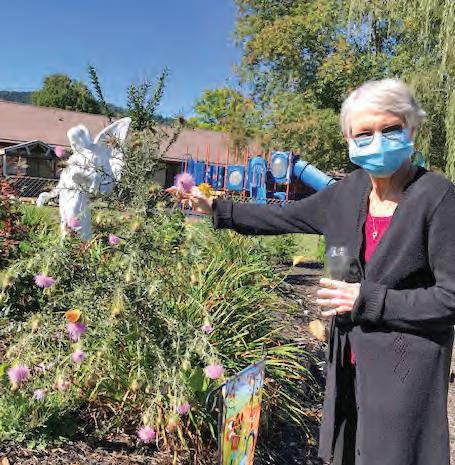






... Provides EMPLOYMENT OPPORTUNITIES to develop skills and learning with highly trained mentors promoting staff empowerment. Employment, volunteering, shadowing and internships are available in a variety of career choices that include health care, therapy, dietary, food service, nutrition, grounds keeping, maintenance and management. assistance, and many incentives.
... and Entry Level Geri-Tech positions are available to get started dietary aides, geri-techs, med aides, nursing assistants, housekeepers, cooks, LPNs, and RNs
